1
It's so curious: one can resist tears and 'behave' very well in the hardest hours of grief. But then someone makes you a friendly sign behind a window, or one notices that a flower that was in bud only yesterday has suddenly blossomed, or a letter slips from a drawer... and everything collapses.Colette
2
Ur be the things I am wiser to know: Idleness, sorrow, a friend, and a foe. Four be the things I'd been better without: Love, curiosity, freckles, and doubt. Three be the things I shall never attain: Envy, content, and sufficient champagne. Three be the things I shall have till I die: Laughter and hope and a sock in the eye.Dorothy Parker
3
Listen with curiosity. Speak with honesty. Act with integrity. The greatest problem with communication is we don’t listen to understand. We listen to reply. When we listen with curiosity, we don’t listen with the intent to reply. We listen for what’s behind the words.Roy T. Bennett
4
So now you must choose.. Are you a child who has not yet become world-weary? Or are you a philosopher who will vow never to become so? To children, the world and everything in it is new, something that gives rise to astonishment. It is not like that for adults. Most adults accept the world as a matter of course. This is precisely where philosophers are a notable exception. A philosopher never gets quite used to the world. To him or her, the world continues to seem a bit unreasonable - bewildering, even enigmatic. Philosophers and small children thus have an important faculty in common. The only thing we require to be good philosophers is the faculty of wonder… .Jostein Gaarder
5
Remember that things are not always as they appear to be… Curiosity creates possibilities and opportunities.Roy T. Bennett
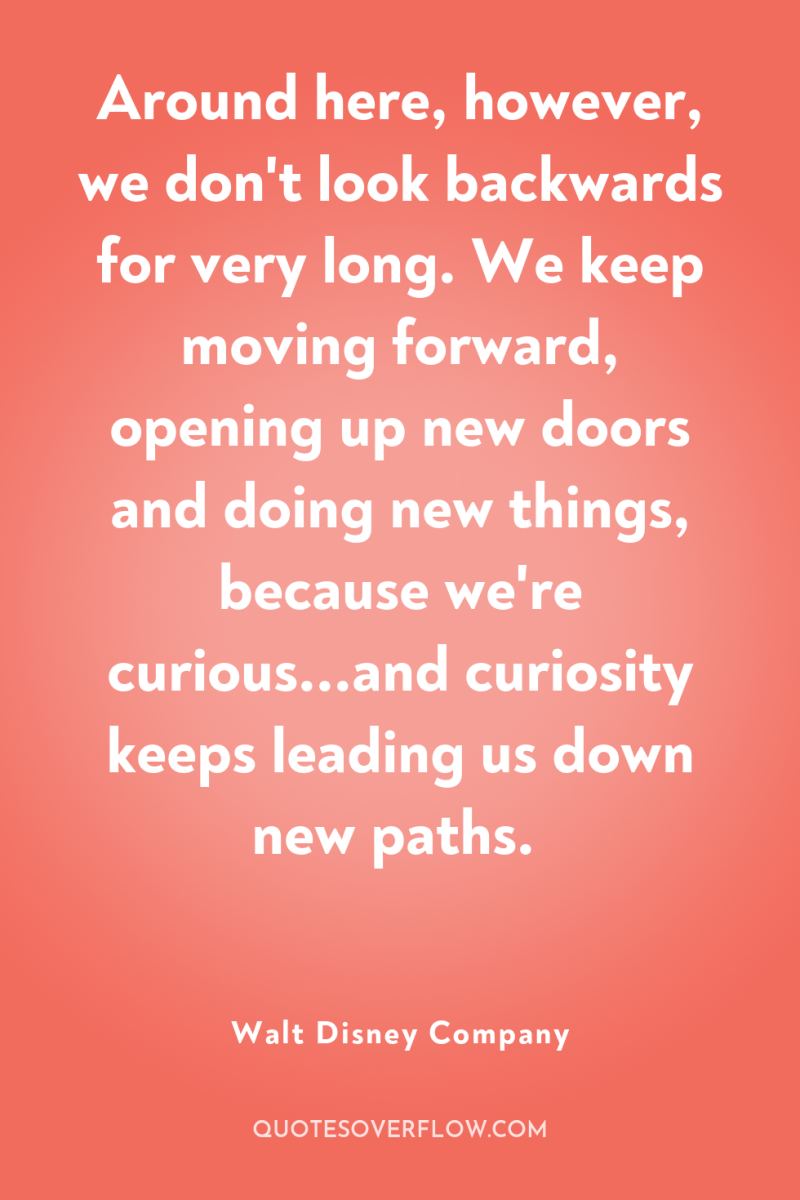
6
Around here, however, we don't look backwards for very long. We keep moving forward, opening up new doors and doing new things, because we're curious...and curiosity keeps leading us down new paths.Walt Disney Company
7
Somehow I can't believe that there are any heights that can't be scaled by a man who knows the secrets of making dreams come true. This special secret, it seems to me, can be summarized in four Cs. They are curiosity, confidence, courage, and constancy, and the greatest of all is confidence. When you believe in a thing, believe in it all the way, implicitly and unquestionable.Walt Disney Company
8
It's daring to be curious about the unknown, to dream big dreams, to live outside prescribed boxes, to take risks, and above all, daring to investigate the way we live until we discover the deepest treasured purpose of why we are here.Luci Swindoll
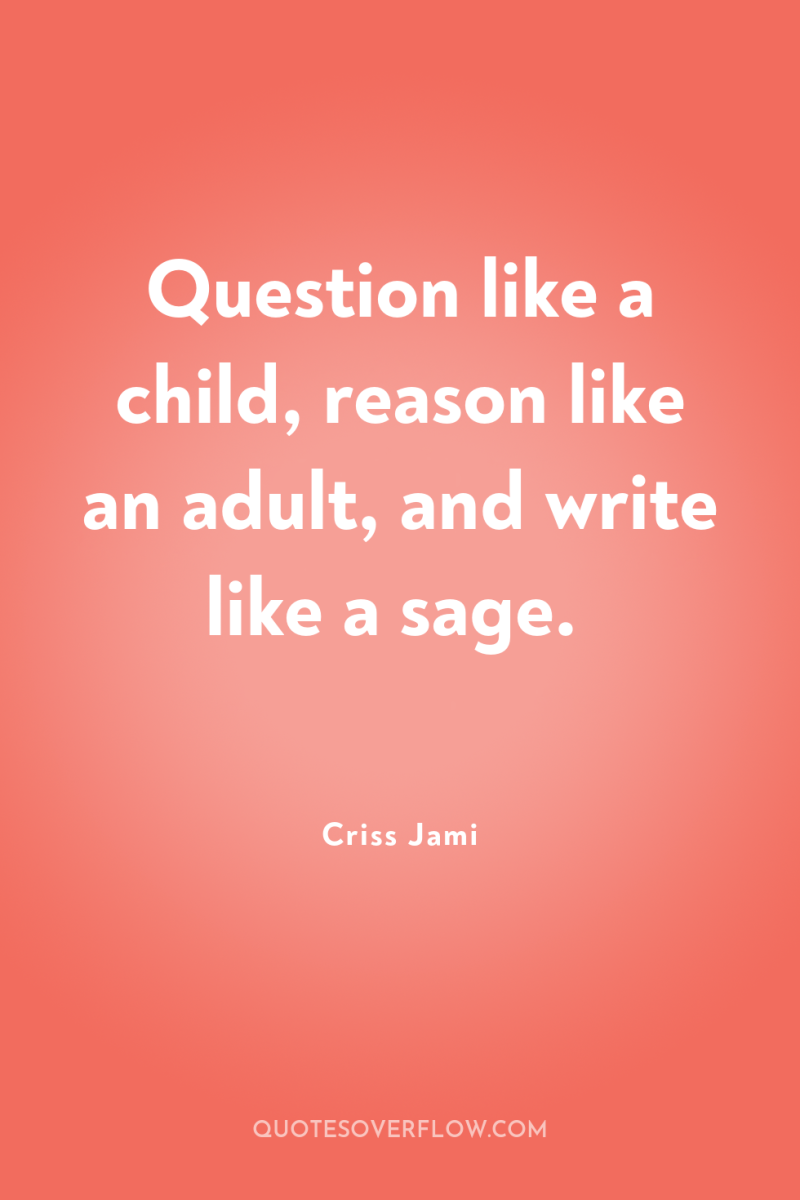
9
Question like a child, reason like an adult, and write like a sage.Criss Jami
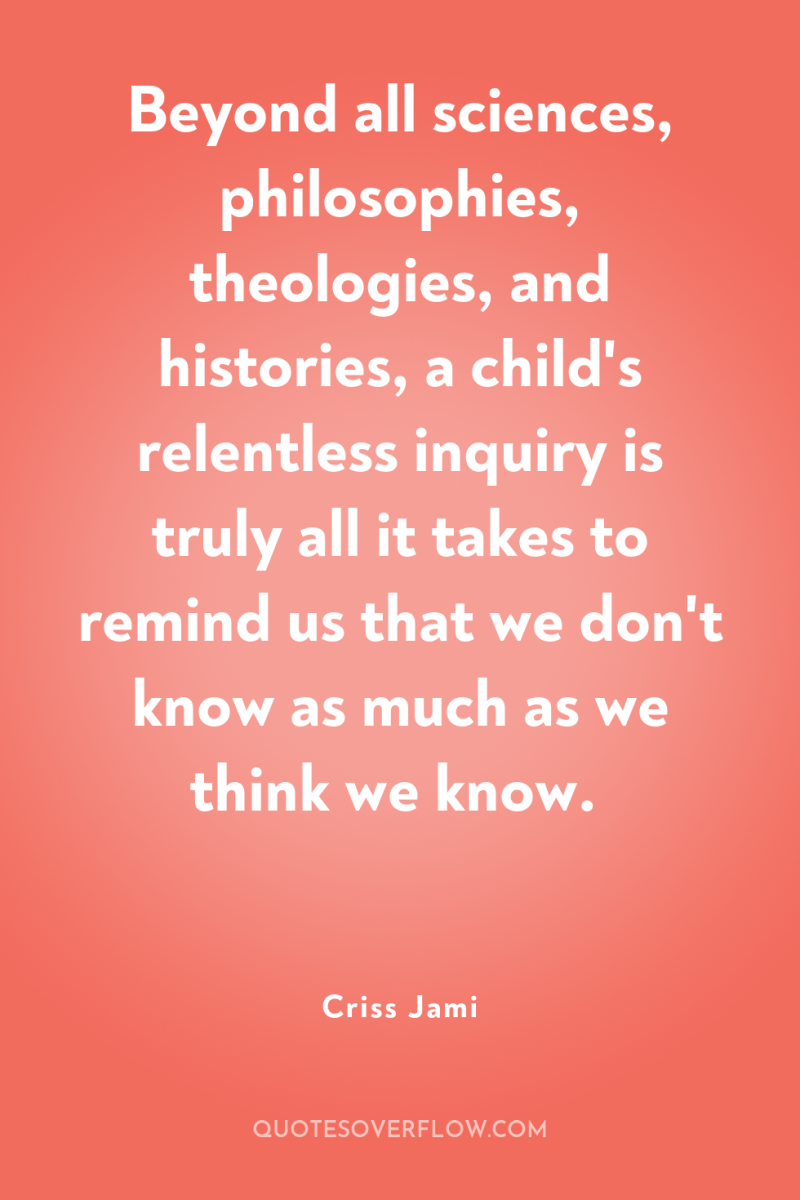
10
Beyond all sciences, philosophies, theologies, and histories, a child's relentless inquiry is truly all it takes to remind us that we don't know as much as we think we know.Criss Jami
11
The complexities of adult life get in the way of the truth. The great philosophers have always been able to clear away the complexities and see simple distinctions - simple once they are stated, vastly difficult before. If we are to follow them we too must be childishly simple in our questions - and maturely wise in our replies.Mortimer J. Adler
12
From time to time I once wondered how one wanders from time to time And think up the paradox line Speak of Epoch's crime Oh I lied, it hasn't happened yet But bet you better believe it's such a habit that I just said that in a past mindsetCriss Jami
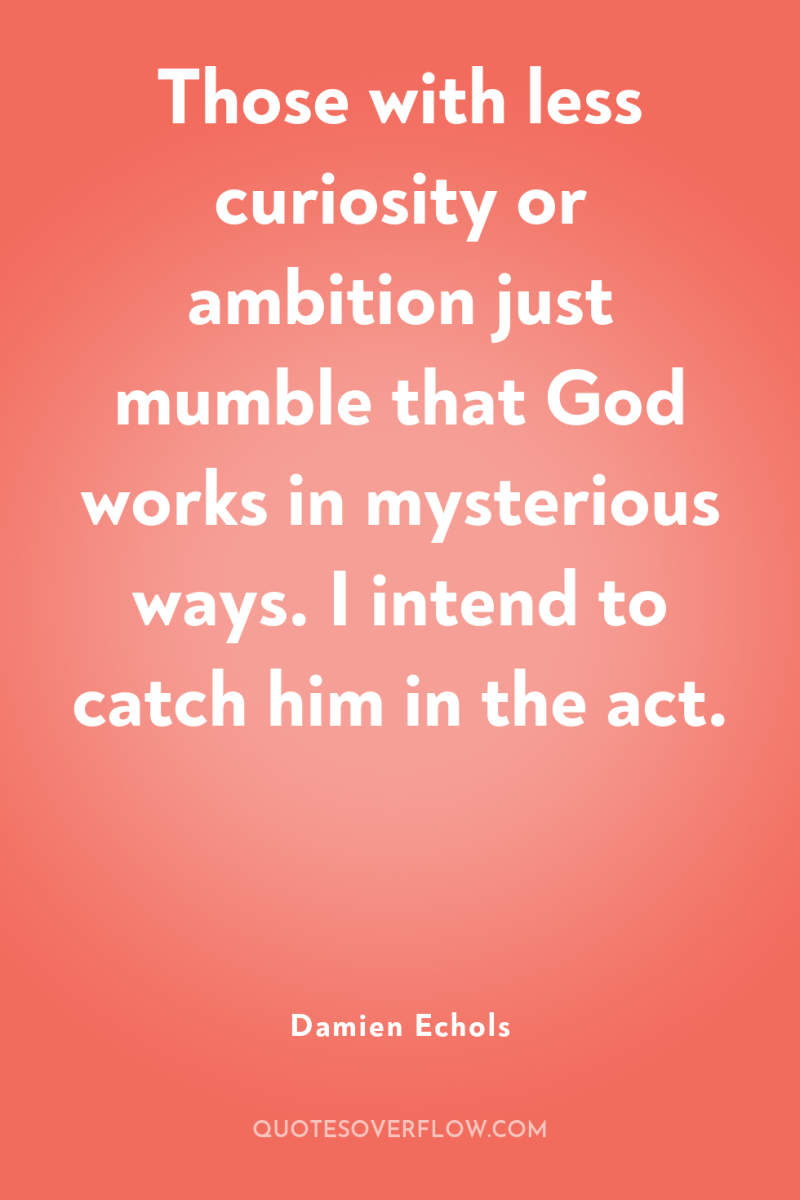
13
Those with less curiosity or ambition just mumble that God works in mysterious ways. I intend to catch him in the act.Damien Echols
14
The generality of mankind is lazy. What distinguishes men of genuine achievement from the rest of us is not so much their intellectual powers and aptitudes as their curiosity, their energy, their fullest use of their potentialities. Nobody really knows how smart or talented he is until he finds the incentives to use himself to the fullest. God has given us more than we know what to do with.Sydney J. Harris

15
If curiosity killed the cat, it was satisfaction that brought it back.Holly Black
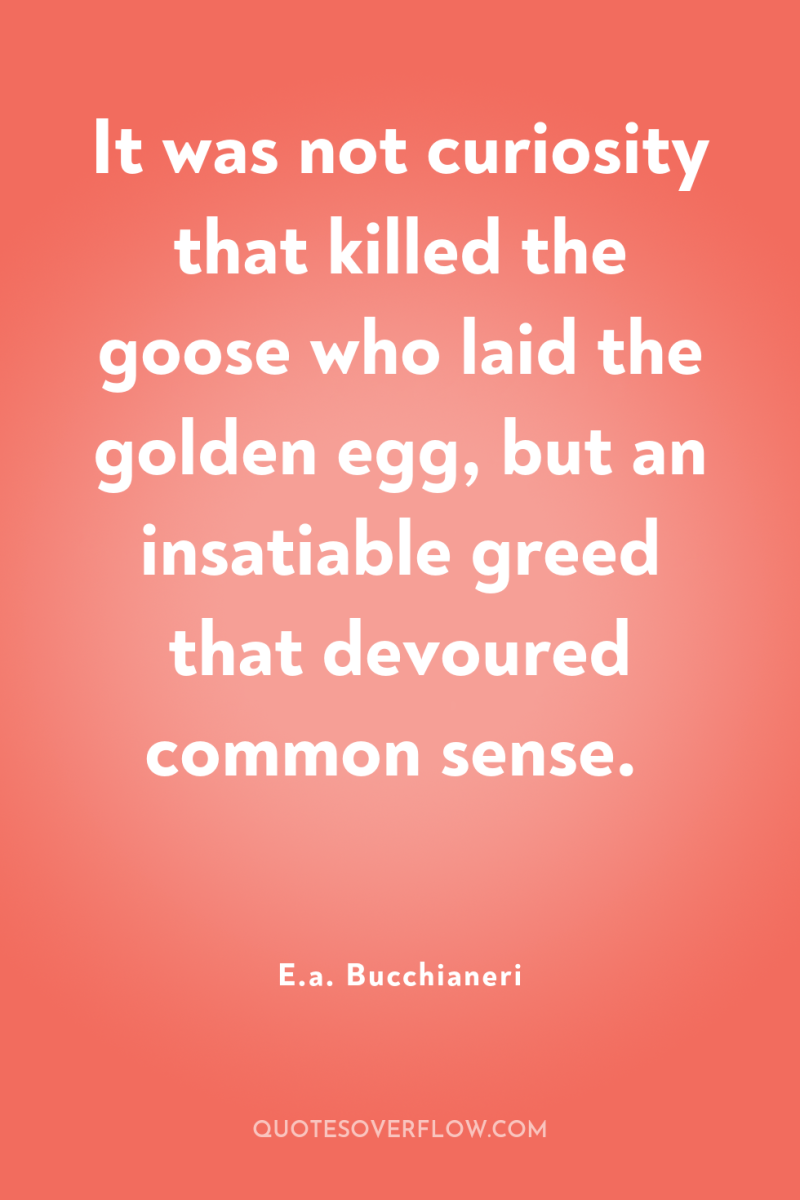
16
It was not curiosity that killed the goose who laid the golden egg, but an insatiable greed that devoured common sense.E.a. Bucchianeri
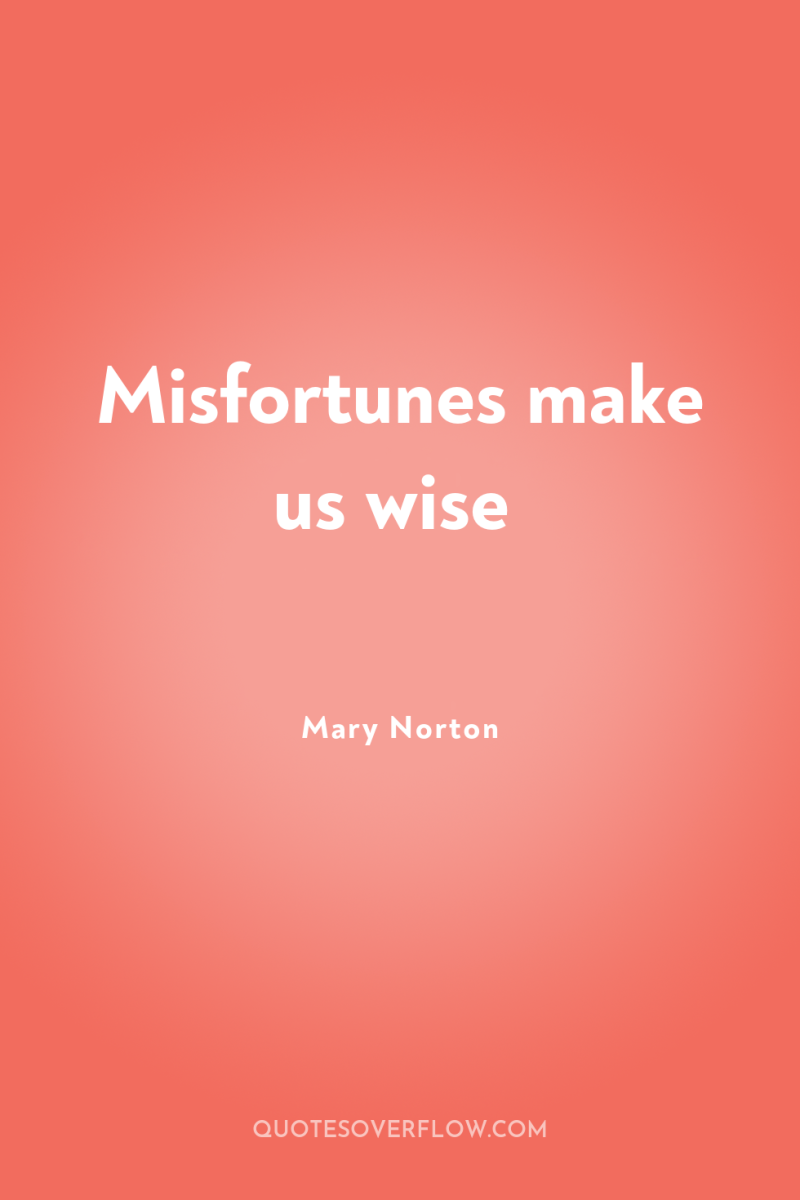
17
Misfortunes make us wiseMary Norton
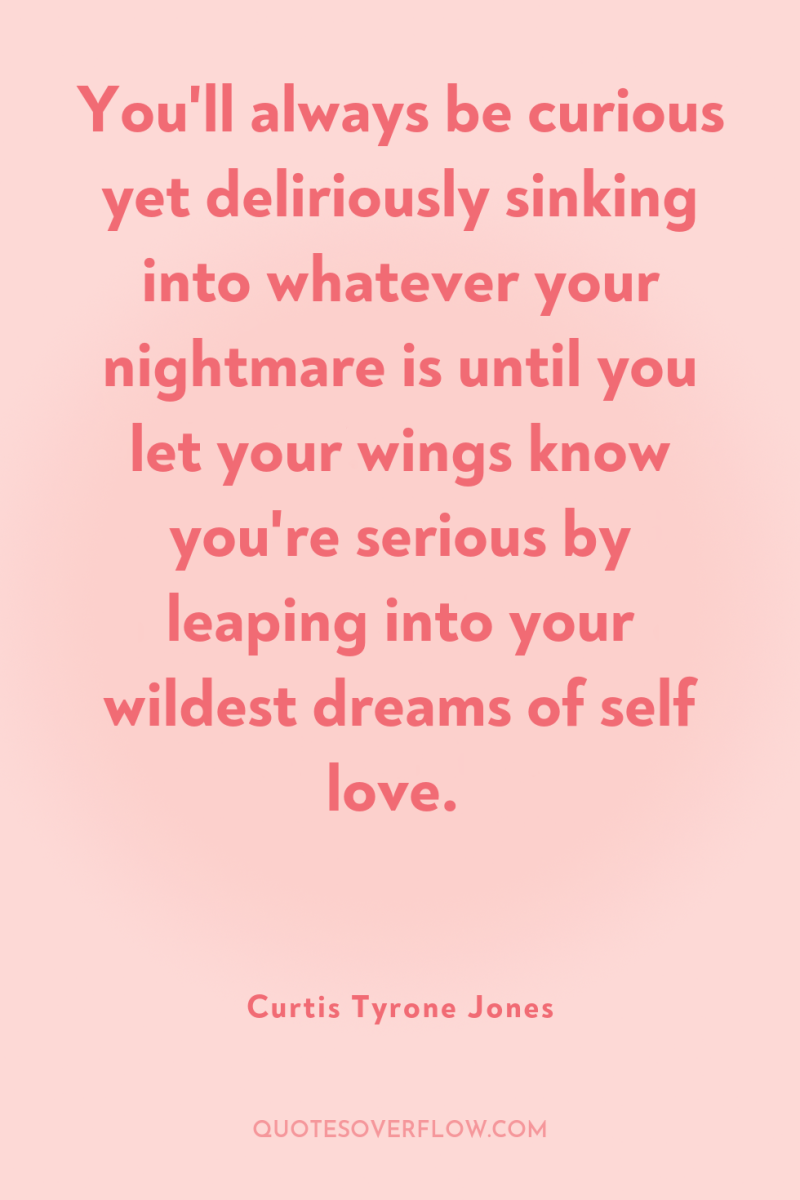
18
You'll always be curious yet deliriously sinking into whatever your nightmare is until you let your wings know you're serious by leaping into your wildest dreams of self love.Curtis Tyrone Jones

19
Listen with curiosity. Speak with honesty. Act with integrity.Roy Bennett
20
When we aren't curious in conversations we judge, tell, blame and even shame, often without even knowing it, which leads to conflict." -The Power Of Curiosity: How To Have Real Conversations That Create Collaboration, Innovation and UnderstandingKirsten Siggins

21
When God takes out the trash, don't go digging back through it. Trust Him.Amaka Imani Nkosazana
22
I do not think he (Chester Arthur) knows anything. He can quote a verse from poetry or a page from Dickens or Thackeray, but these are only leaves springing from a root out of dry ground. His vital forces are not fed, and very soon he has given out his all.Harriet Blaine
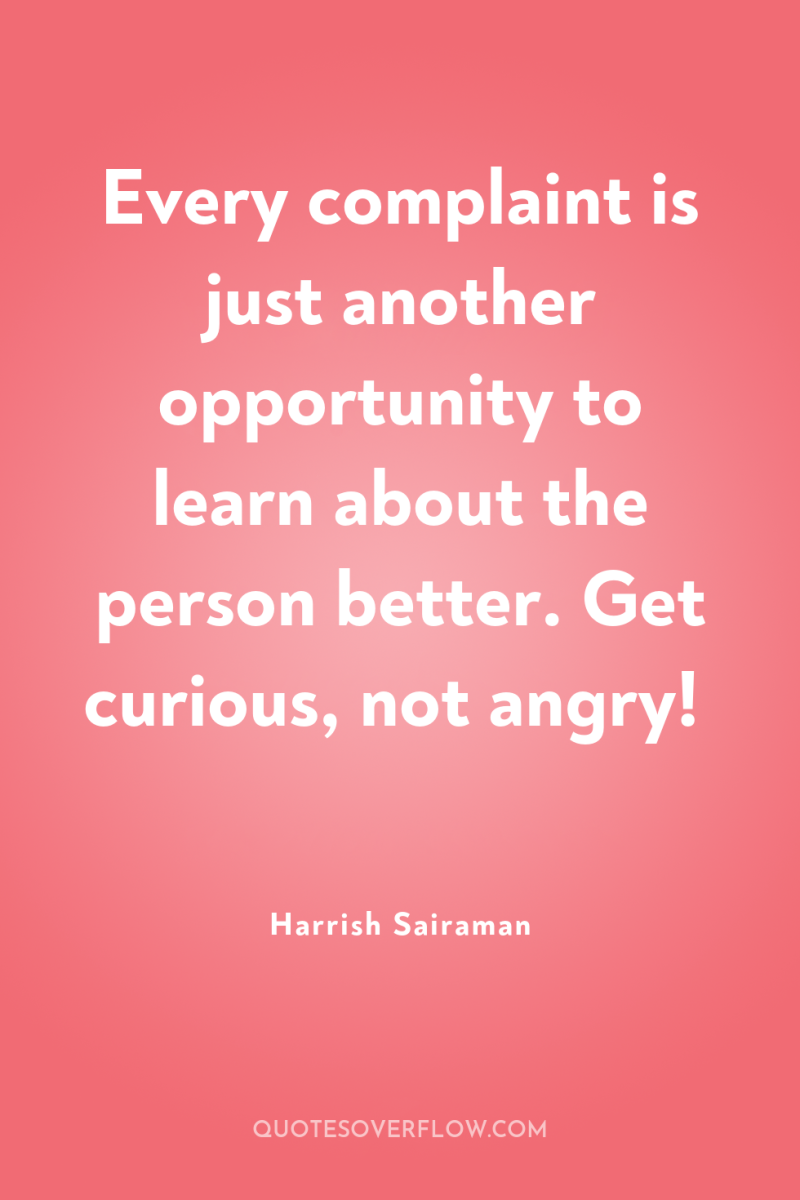
23
Every complaint is just another opportunity to learn about the person better. Get curious, not angry!Harrish Sairaman
24
It's a good sign but rare instance when, in a relationship, you find that the more you learn about the other person, the more you continue to desire them. A sturdy bond delights in that degree of youthful intrigue. Love loves its youth.Criss Jami
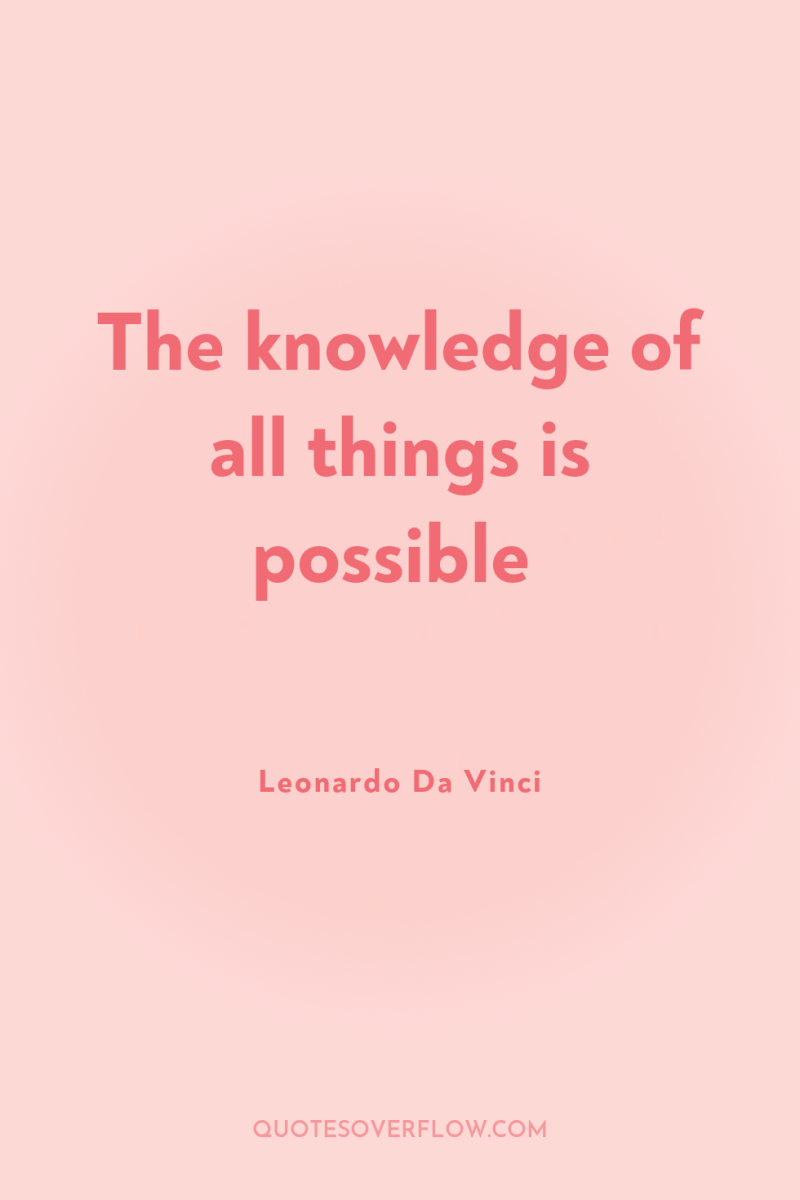
25
The knowledge of all things is possibleLeonardo Da Vinci
26
The ability to retain a child's view of the world with at the same time a mature understanding of what it means to retain it, is extremely rare - and a person who has these qualities is likely to be able to contribute something really important to our thinking.Mortimer J. Adler
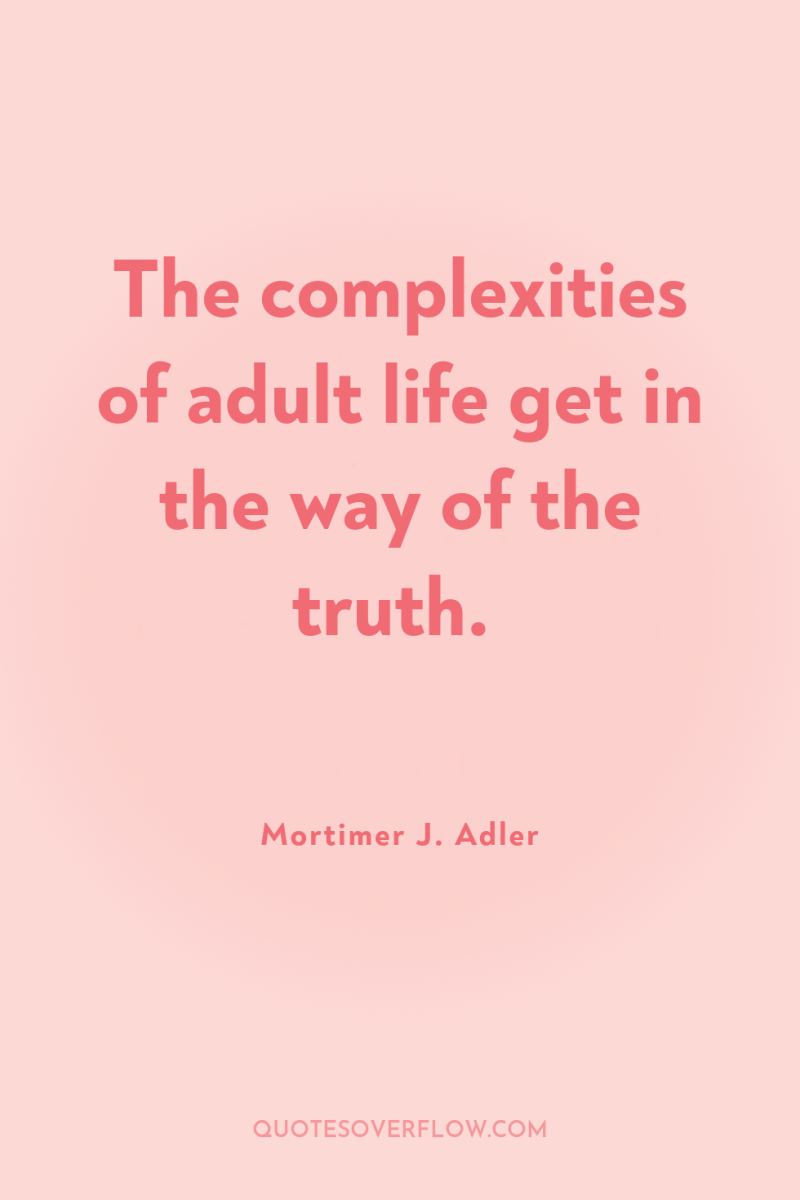
27
The complexities of adult life get in the way of the truth.Mortimer J. Adler
28
A monk should surely love his books with humility, wishing their good and not the glory of his own curiosity; but what the temptation of adultery is for laymen and the yearning for riches is for secular ecclesiastics, the seduction of knowledge is for monks.Umberto Eco
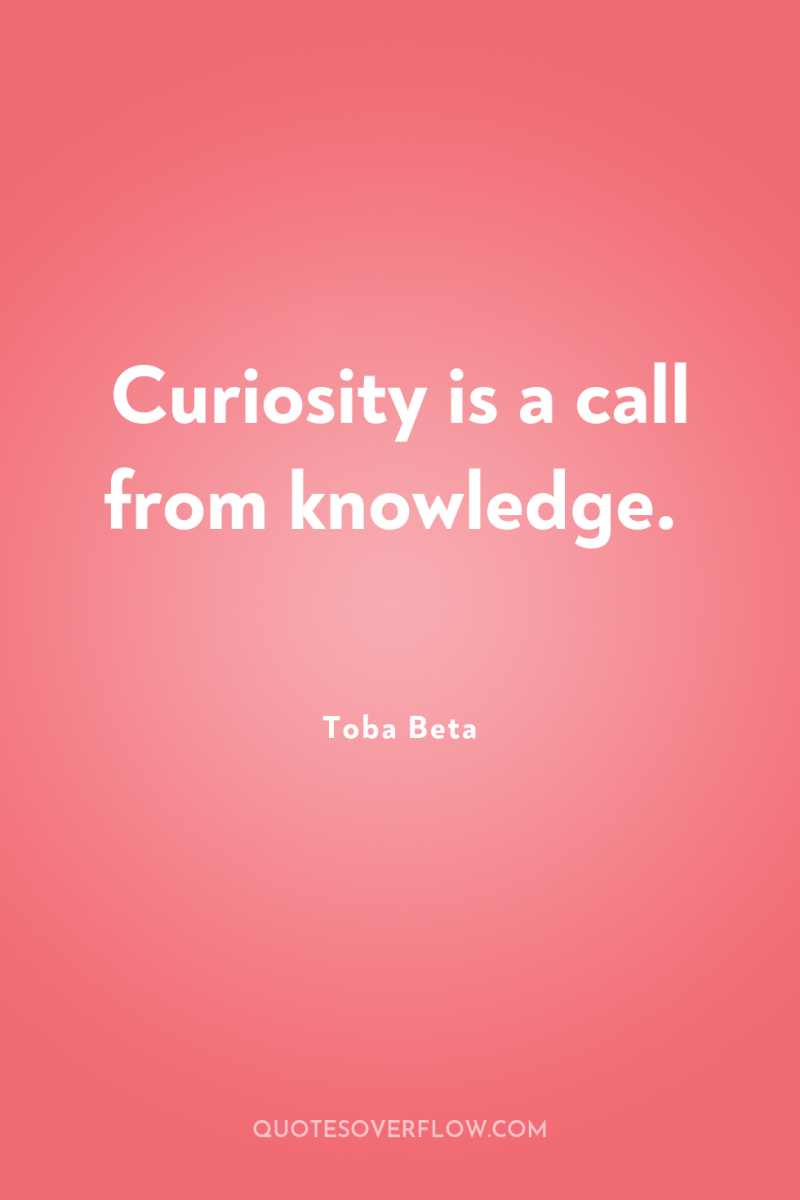
29
Curiosity is a call from knowledge.Toba Beta
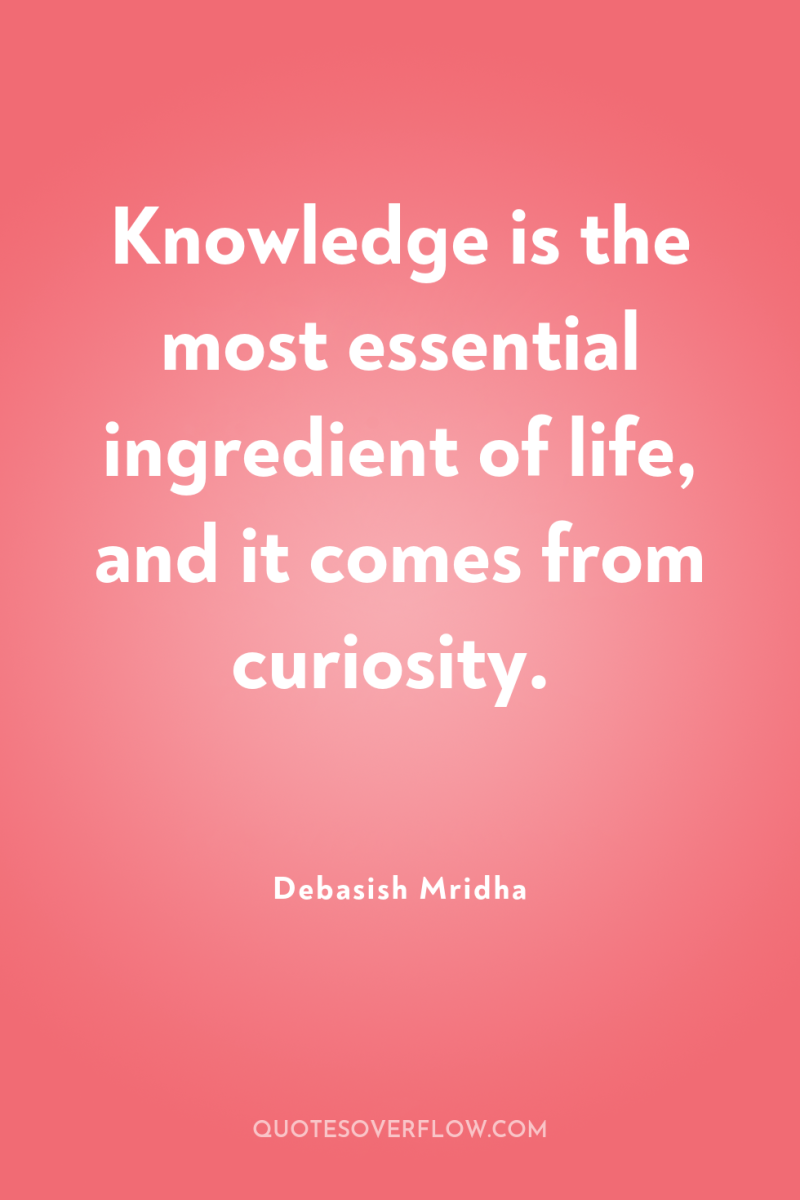
30
Knowledge is the most essential ingredient of life, and it comes from curiosity.Debasish Mridha
31
This was the end of the Renaissance. Culture, once beloved and fostered by the papacy, opened the way to dangerous freedom. Then - as now - knowledge, culture, intellectual curiosity became suspect, even dangerous to oppressive regimes: knowledge leading to engaging the mind into reasoning, culture into wanting to know more, intellectual curiosity sharpening the appetite for information, fact. Ignorance was considered safe and political oppression went hand in hand with the congregation of the Inquisition. .Gaia Servadio
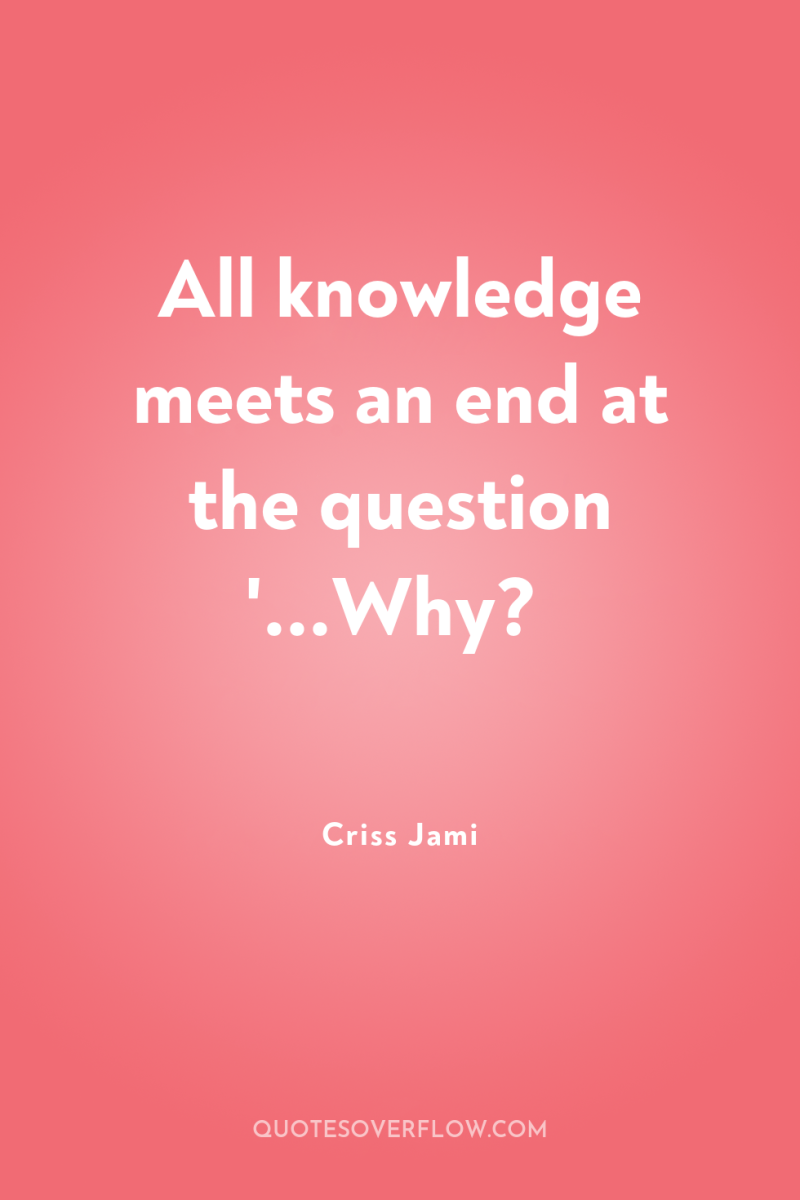
32
All knowledge meets an end at the question '...Why?Criss Jami
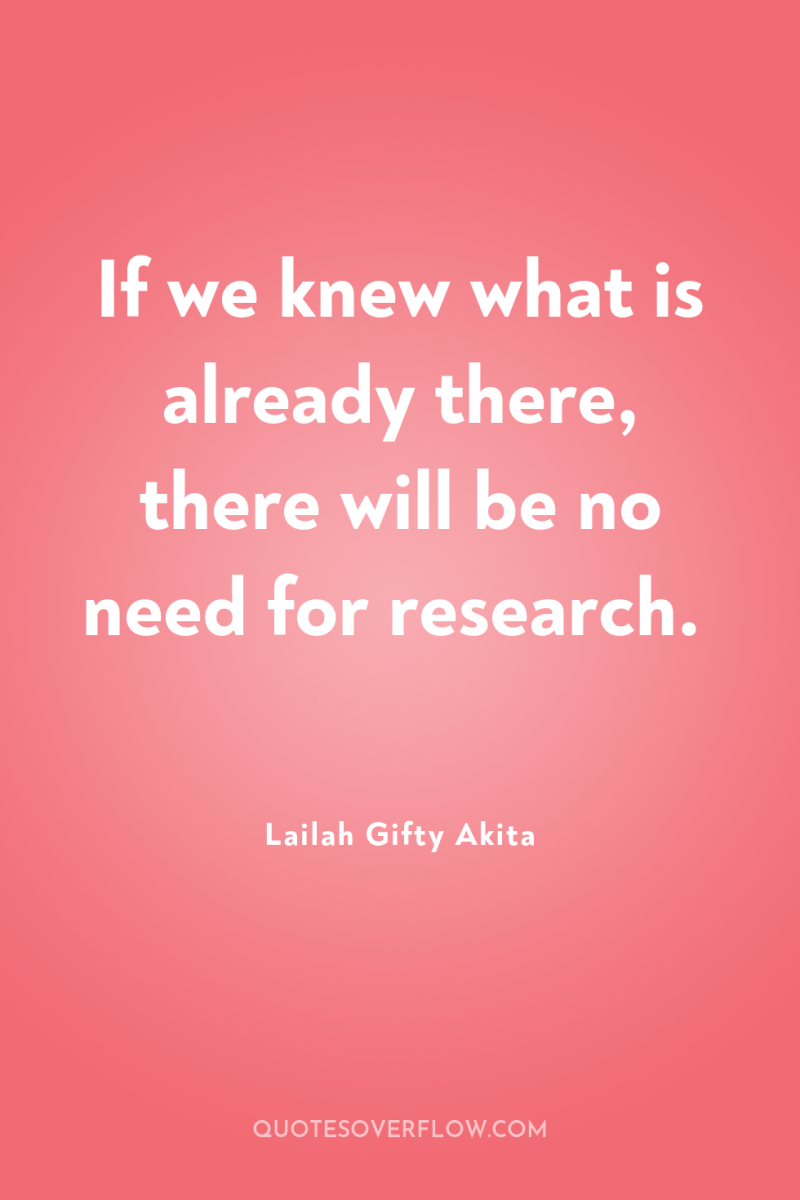
33
If we knew what is already there, there will be no need for research.Lailah Gifty Akita
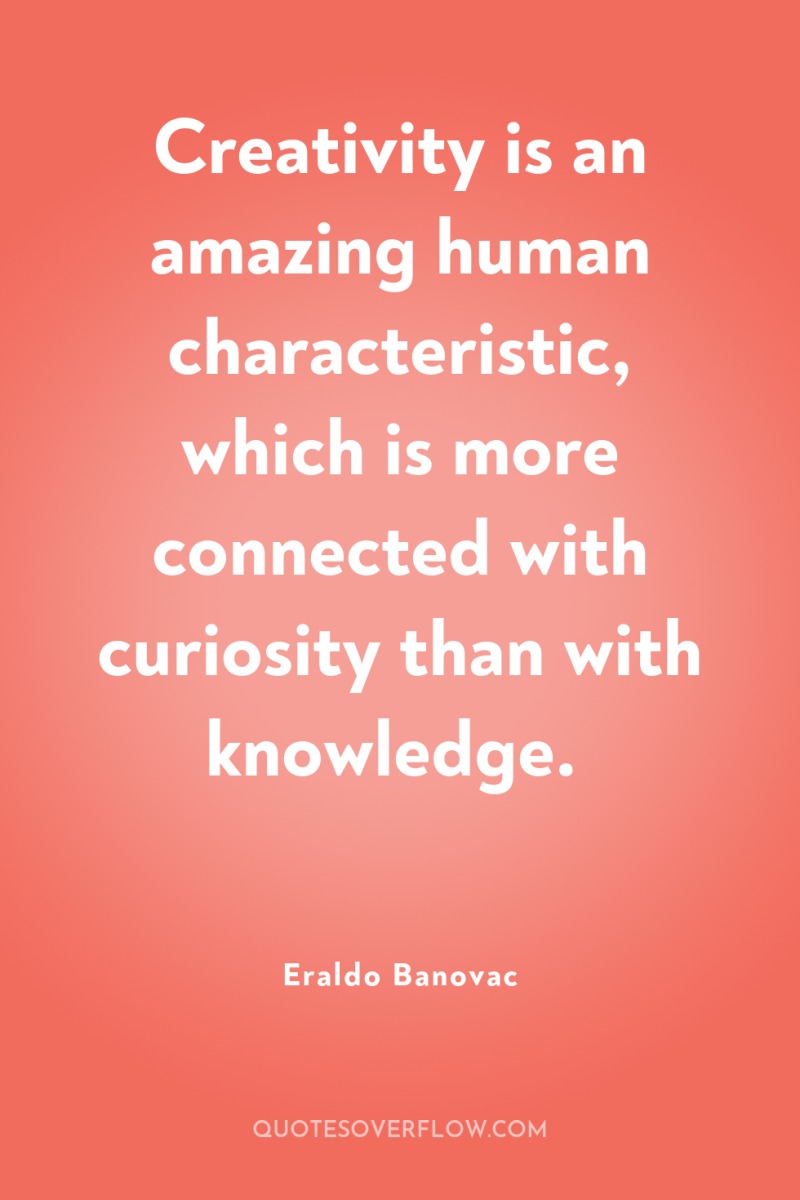
34
Creativity is an amazing human characteristic, which is more connected with curiosity than with knowledge.Eraldo Banovac
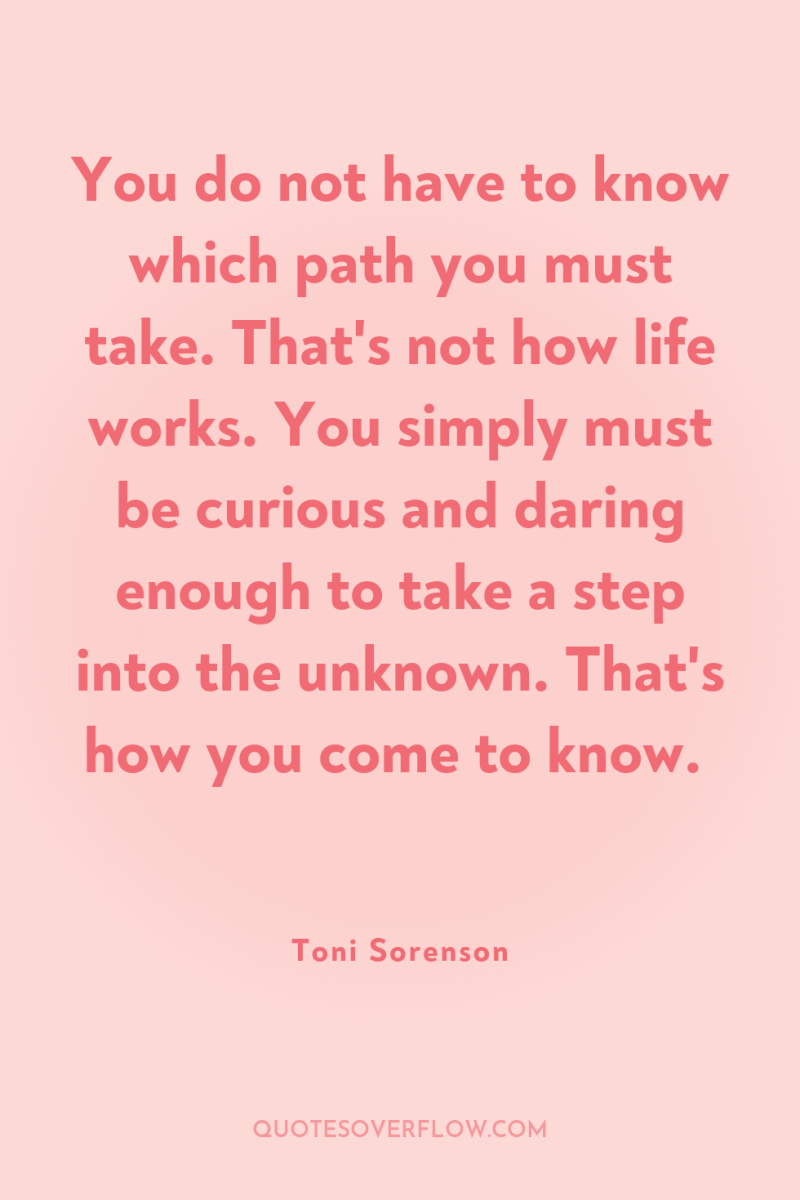
35
You do not have to know which path you must take. That's not how life works. You simply must be curious and daring enough to take a step into the unknown. That's how you come to know.Toni Sorenson
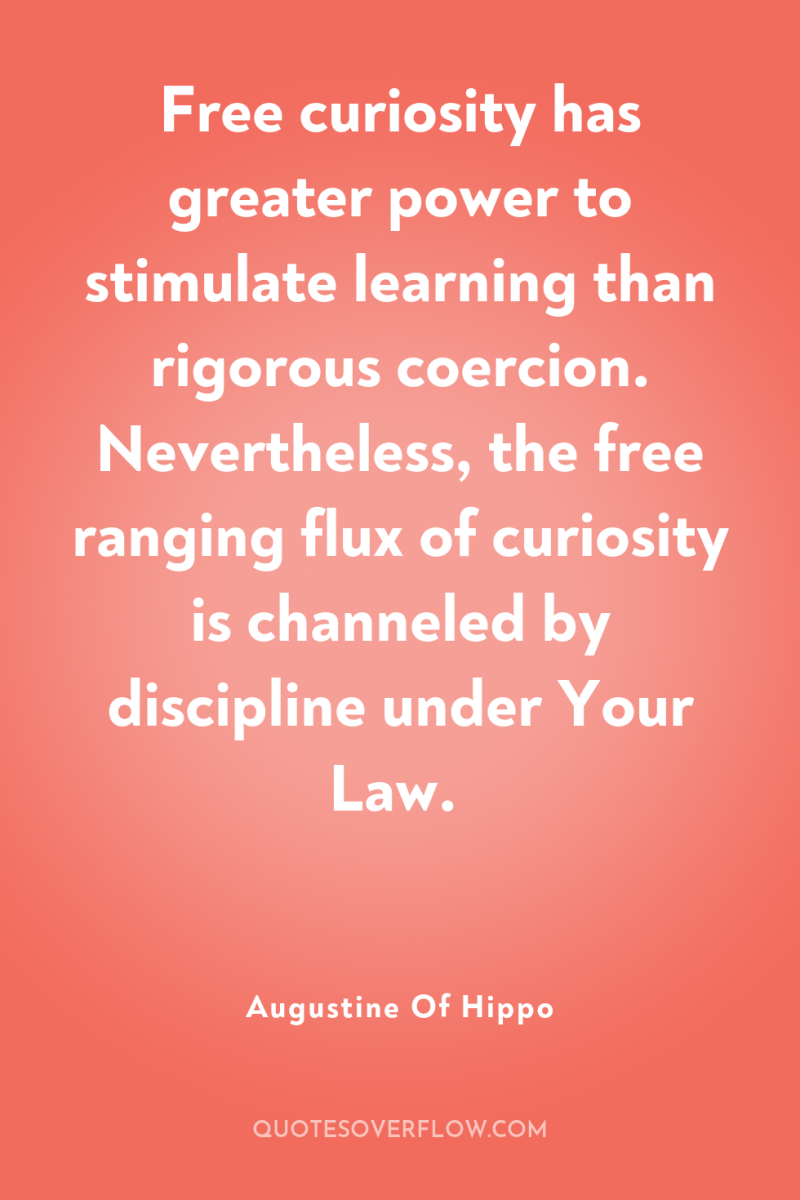
36
Free curiosity has greater power to stimulate learning than rigorous coercion. Nevertheless, the free ranging flux of curiosity is channeled by discipline under Your Law.Augustine Of Hippo
37
Children are notoriously curious about everything, everything except... the things people want them to know. It then remains for us to refrain from forcing any kind of knowledge upon them, and they will be curious about everything.Floyd Dell
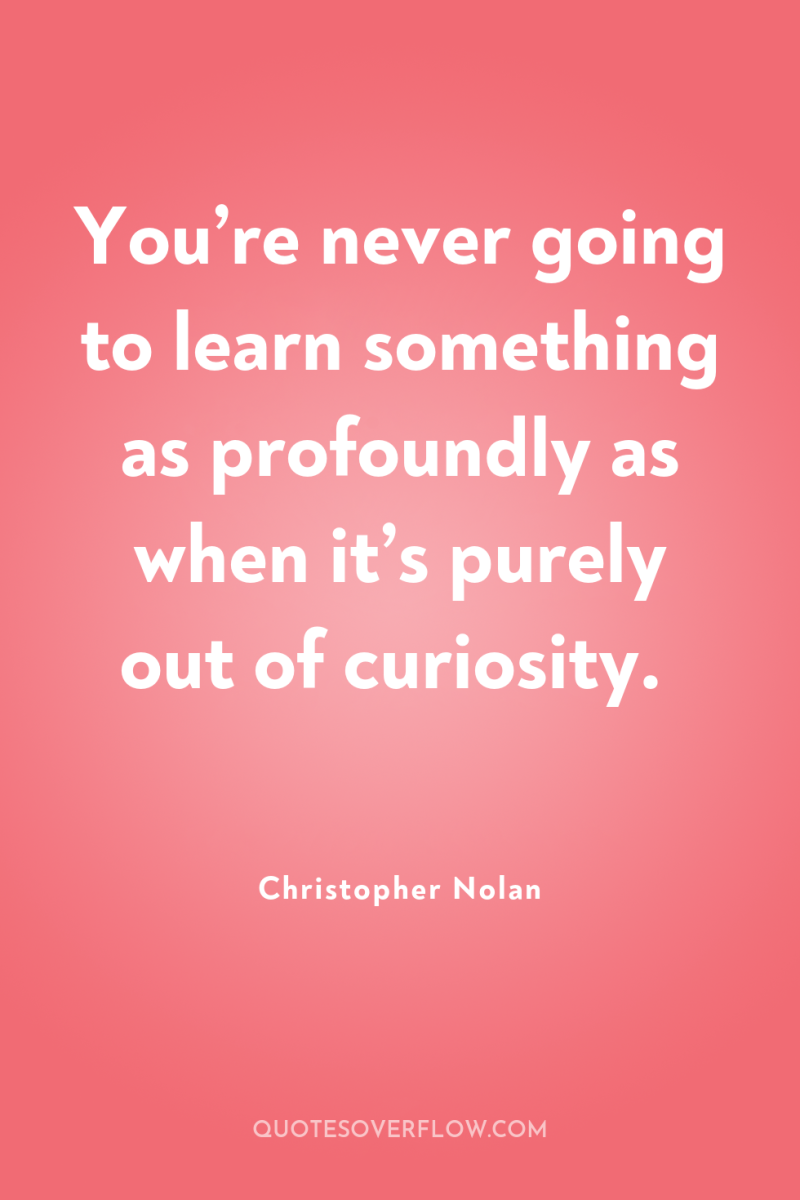
38
You’re never going to learn something as profoundly as when it’s purely out of curiosity.Christopher Nolan
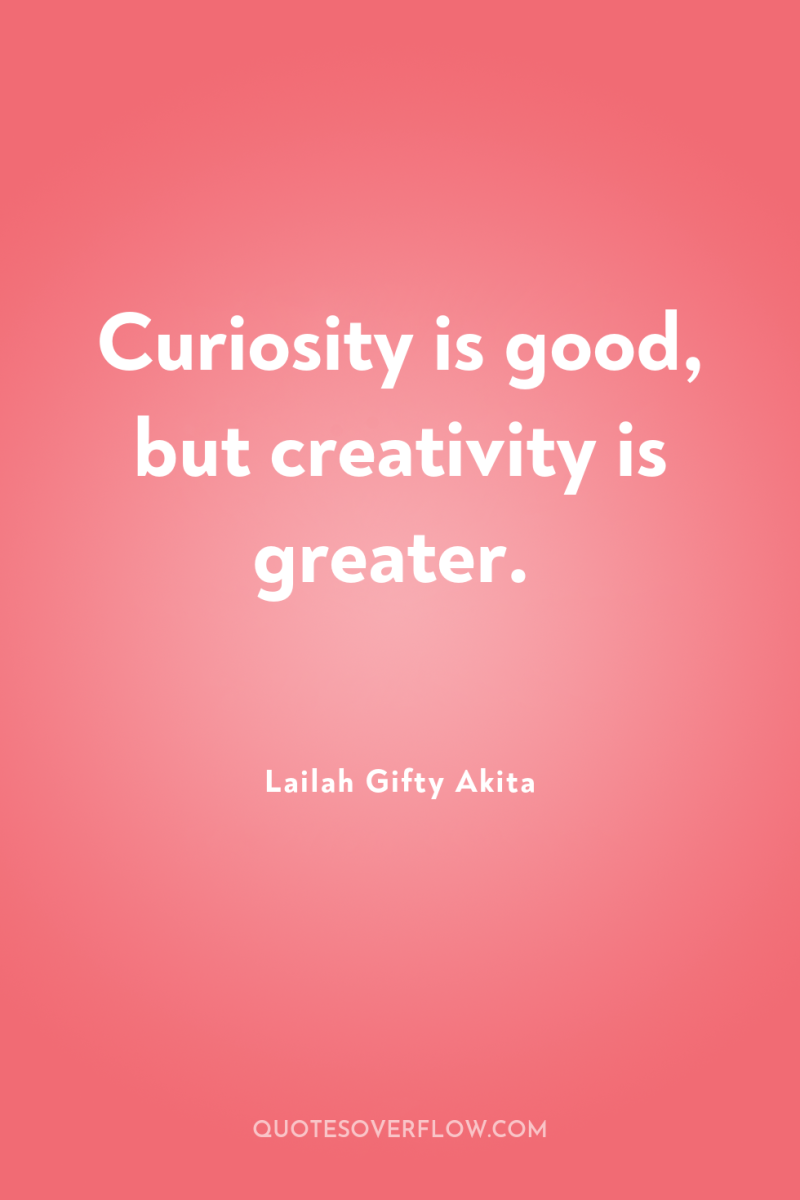
39
Curiosity is good, but creativity is greater.Lailah Gifty Akita

40
Everything interested him and everything excited him.Barbara W. Tuchman
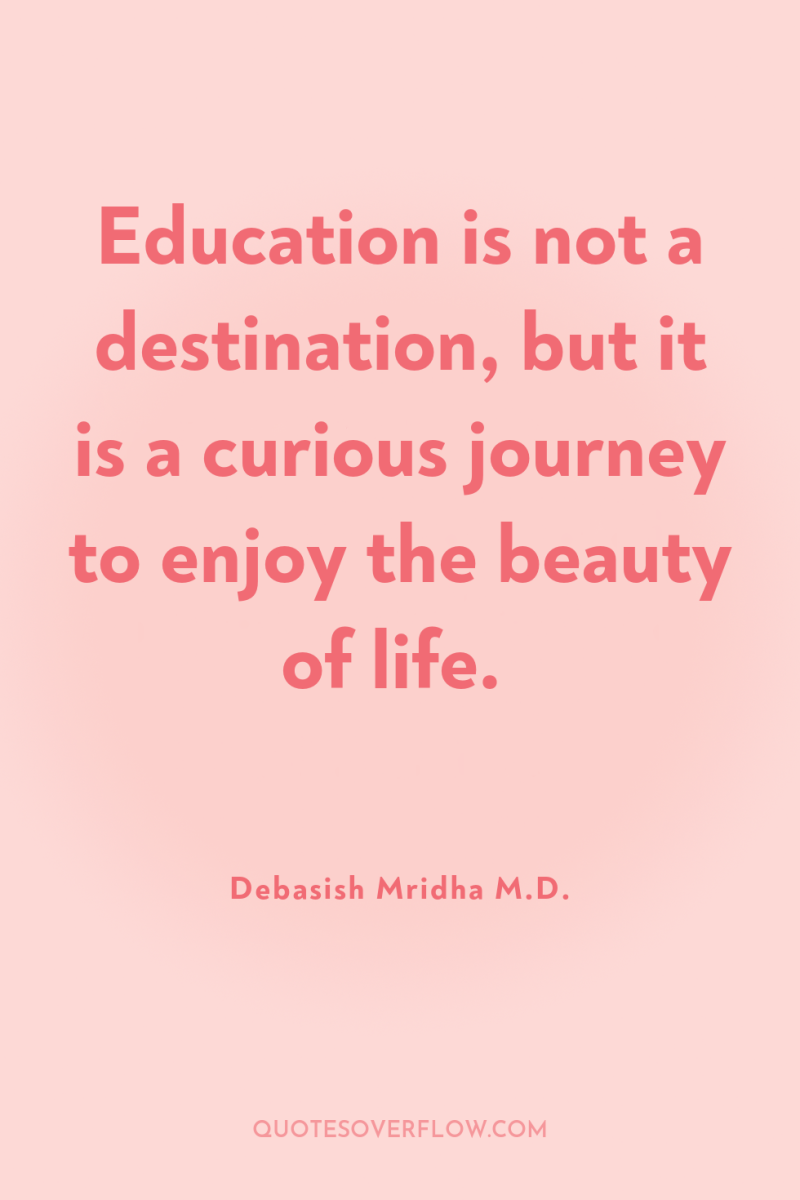
41
Education is not a destination, but it is a curious journey to enjoy the beauty of life.Debasish Mridha M.D.
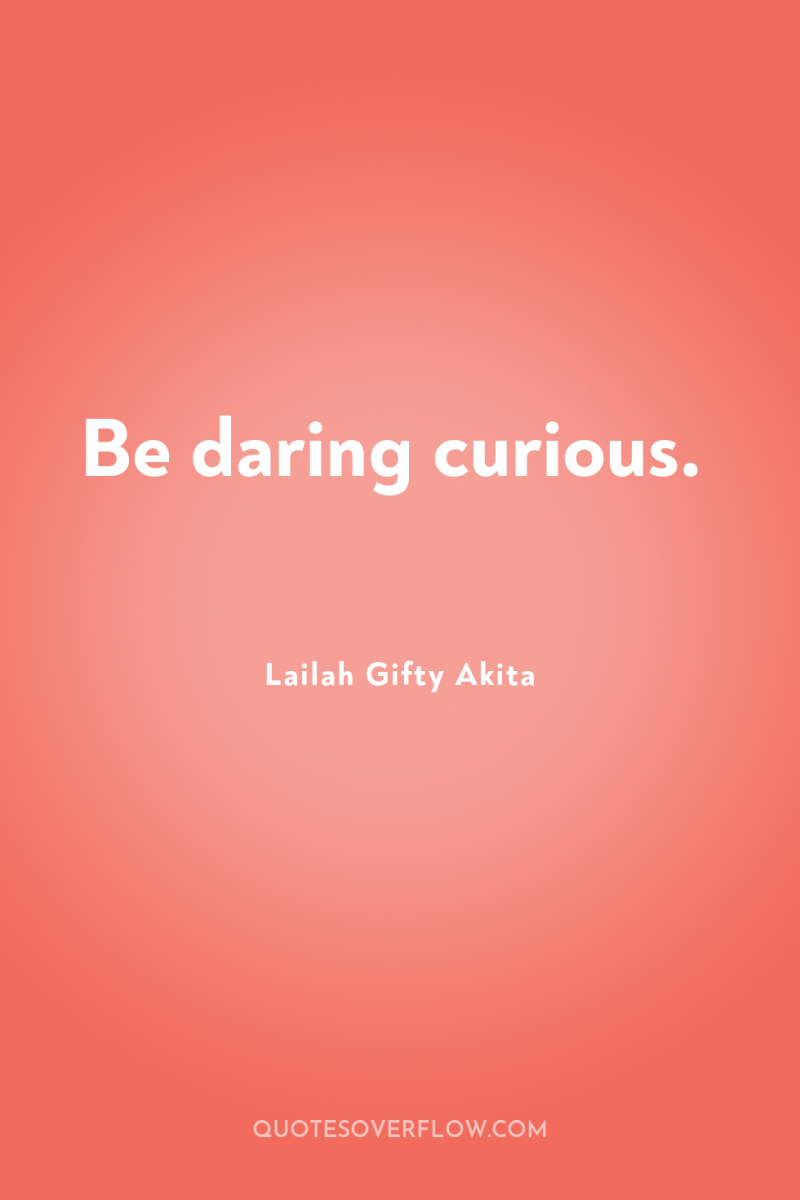
42
Be daring curious.Lailah Gifty Akita
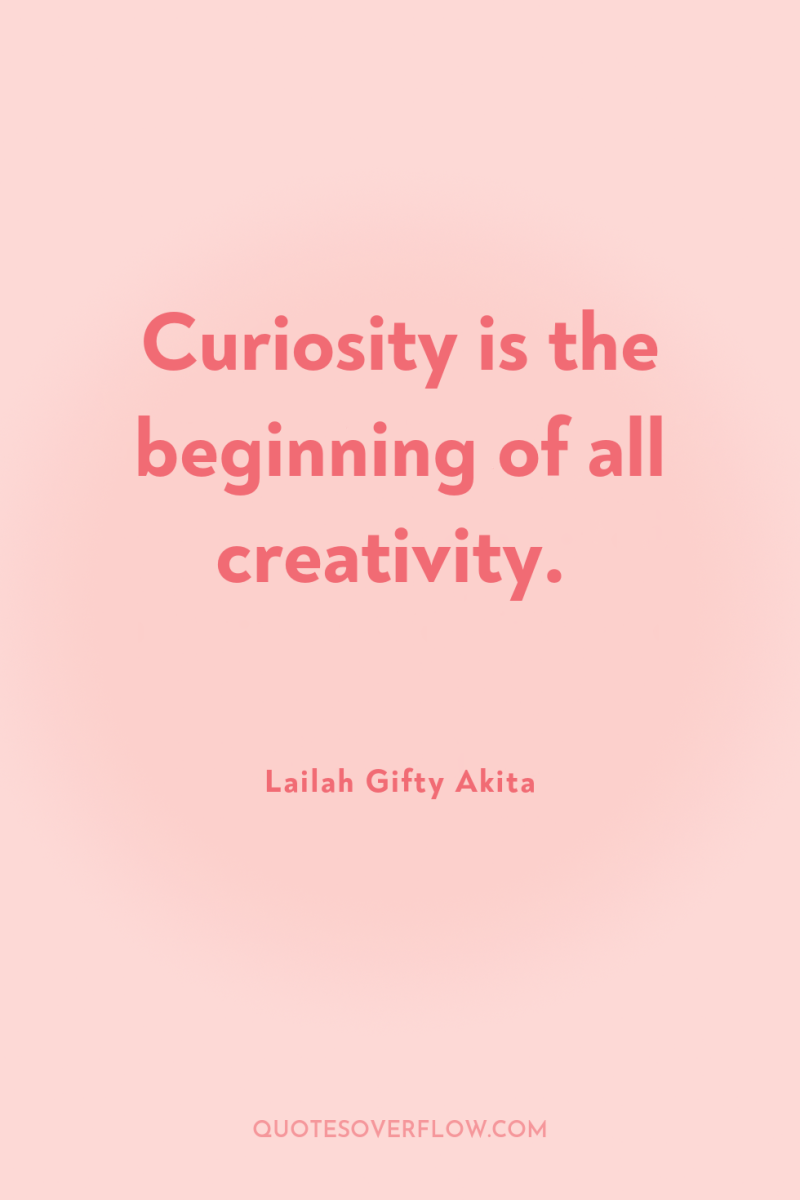
43
Curiosity is the beginning of all creativity.Lailah Gifty Akita
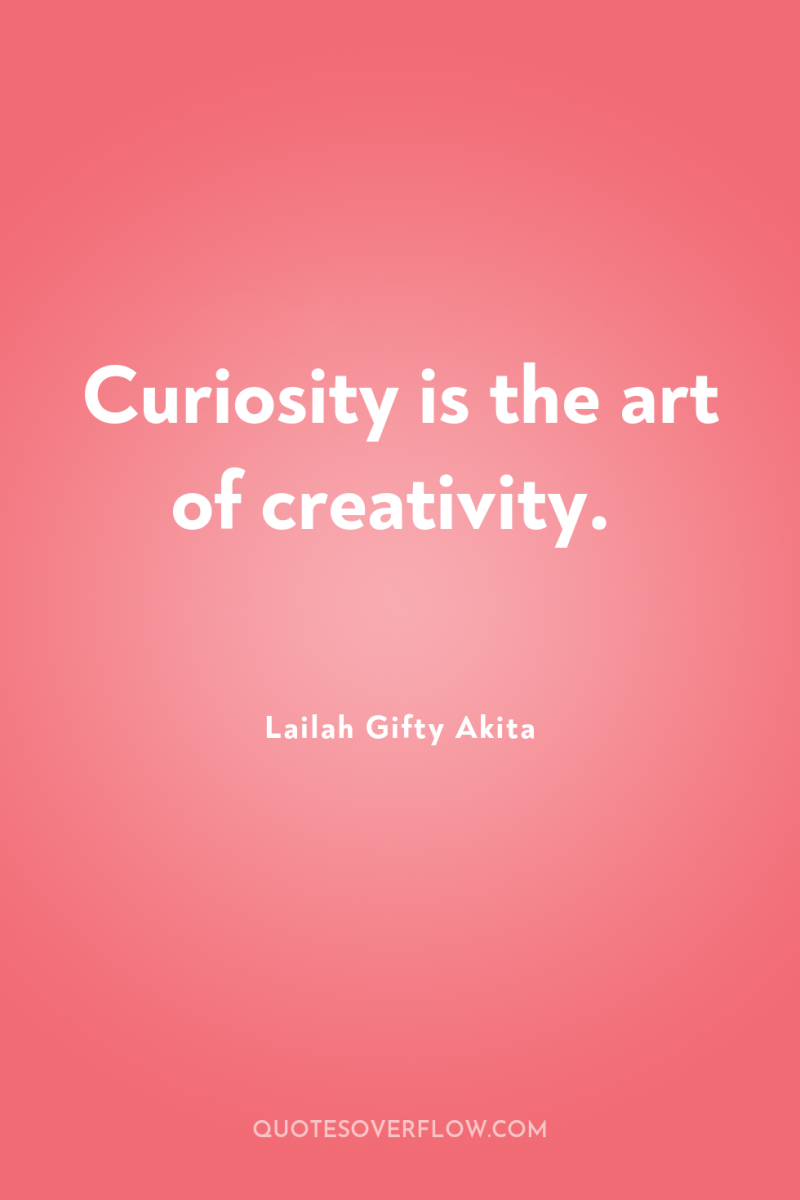
44
Curiosity is the art of creativity.Lailah Gifty Akita
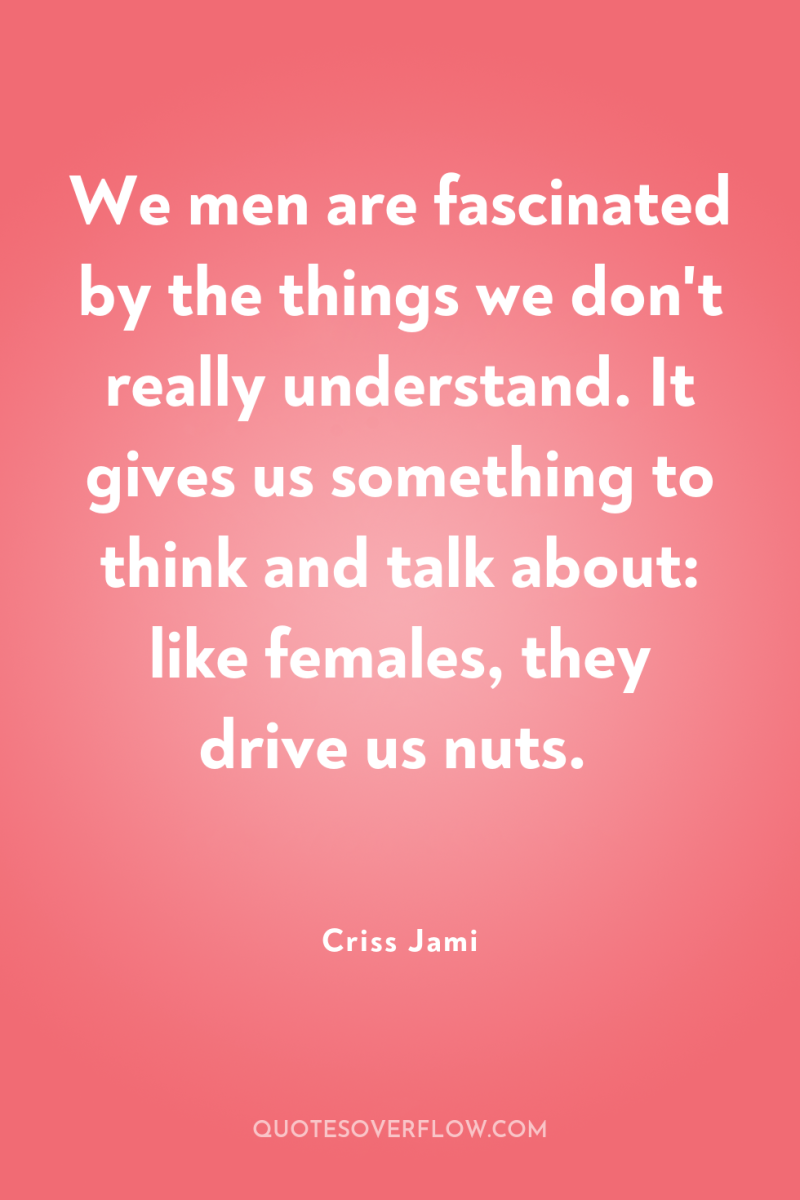
45
We men are fascinated by the things we don't really understand. It gives us something to think and talk about: like females, they drive us nuts.Criss Jami
46
If there’s one thing all diviners share, it’s curiosity. We really can’t help it; it’s just part of who we are. If you dug out a tunnel somewhere in the wilderness a thousand miles from anywhere and hung a sign on it saying, ‘Warning, this leads to the Temple of Horrendous Doom. Do not enter, ever. No, not even then’, you’d get back from lunch to find a diviner already inside and two more about to go in. Come to think about it, that might explain why there are so few of us.Benedict Jacka
47
The important thing is not to stop questioning. Curiosity has its own reason for existence. One cannot help but be in awe when he contemplates the mysteries of eternity, of life, of the marvelous structure of reality. It is enough if one tries merely to comprehend a little of this mystery eacAlbert Einstein
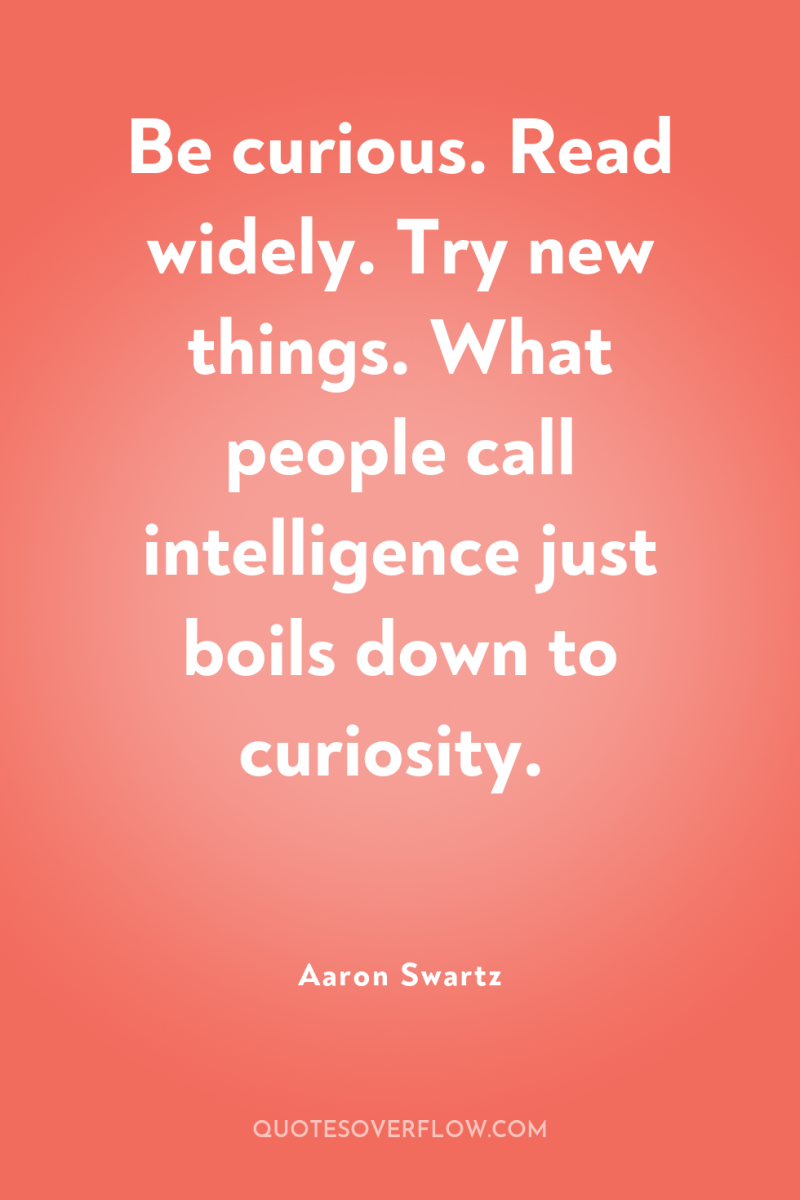
48
Be curious. Read widely. Try new things. What people call intelligence just boils down to curiosity.Aaron Swartz
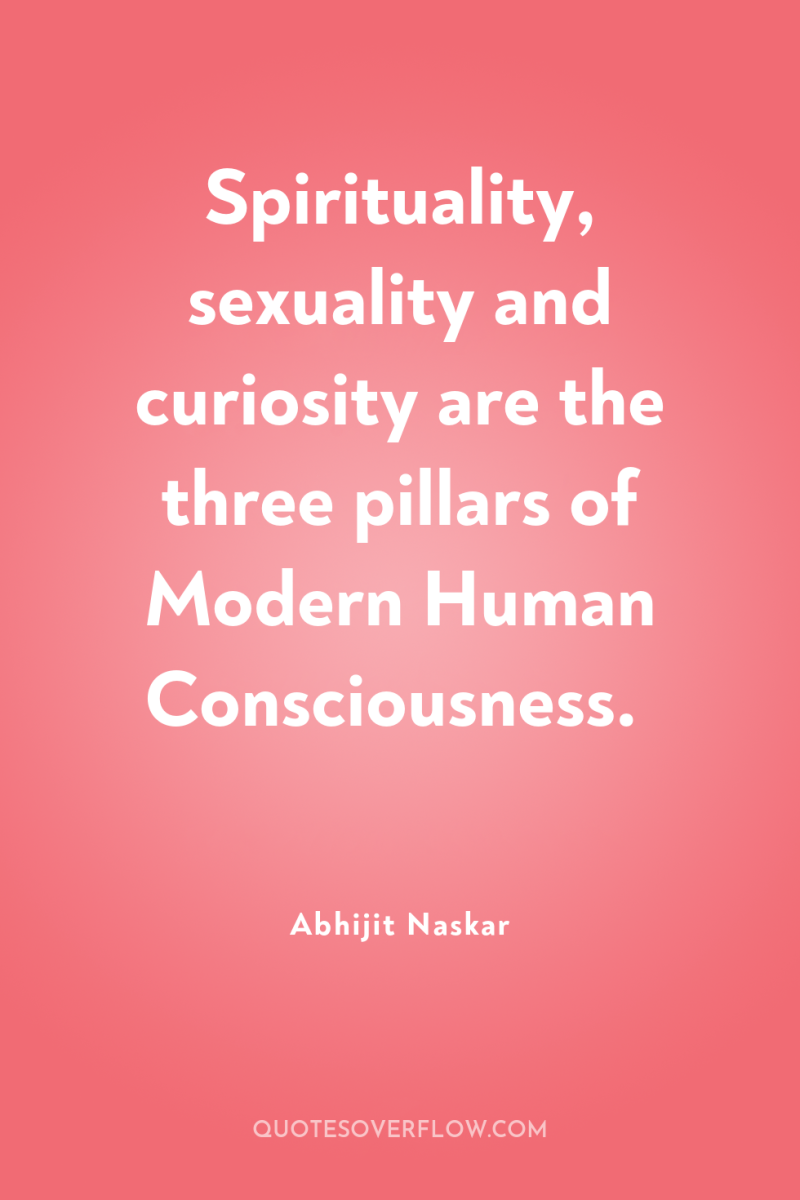
49
Spirituality, sexuality and curiosity are the three pillars of Modern Human Consciousness.Abhijit Naskar
51
Katherine gave in to the wonder of the moment, imagining herself in the astronauts' place. What emotions welled up from the depths of their hearts as they regarded their watery blue home from the void of space? How did it feel to be separated by a nearly unimaginable gulf from the rest of humanity yet carry the hopes, dreams, and fears of their entire species there with them in their tiny, vulnerable craft? Most people she knew wouldn't have traded places with the astronauts for all of the gold in Fort Knox. The men existed all alone out their in the void of space, connected so tenuously to Earth, with the real possibility that something could go wrong. But given the chance to throw her lot in with the astronauts, Katherine Johnson would have packed her bags immediately. Even without the pressure of the space race, even without the mandate to beat the enemy. For Katherine Johnson, curiosity always bested fear.Margot Lee Shetterly
52
Long ago there was a little boy who lived in the wood with his father and his sister. One night, the three of them were out collecting firewood when they heard a low, delicate whimper. The father realised it was an injured animal and ordered the children to fetch water from the lake, whilst he followed the sound. Hours past but the father did not return. The children became fearful for their father’s safety and in their moment of fright, they disobeyed their father in order to find him. And find him they did. However, he was no longer the man he once was. Both his eyes were slit through their centre, oozing blood down the paleness of his face. His neck had been torn open. The entirety of his midsection was split but nothing, not one, single organ, seemed to be left within. Each limb still remained, however they had been dragged, with some exceptional force, in the opposite direction to which they were designed. The children screamed and ran, though the image of their father’s mangled corpse seemed to chase after them. They slept. Within the whisper of the wind came the sweet tune of a woman’s song. The little girl awoke to the feeling of happiness, security and motherly love that the song carried with it. She needed to find the woman it had come from. Leaving her brother, she took off into the wood to try and find the singer. The little boy quickly entered into a spit of panic when he found his sister missing. He didn’t know whether he should call out for her, look for her or wait. But waiting could mean the worst, he thought, and so he took off into the woods after her. He had searched everywhere, every dark corner and decrepit tree, before reaching the lake. The moon reflected off its black surface, which drew his attention to something bobbing within the ripples. It was a leg. When he caught sight of the foot, the boy fell to his knees. He recognised the shoe. It was his sister’s shoe; his sister’s leg. Soon enough, the other body parts came drifting to join the leg, forming a rough manifestation of what was once his sister’s living body. Firstly, there was a head facing down in the water, then arms seemingly blue under the moonlight, and lastly a torso coated in her favourite dress. He felt sick, lost, terrified to his very core. Just as thoughts of never being whole again began to pain his chest, the boy heard the snapping of a twig behind him. He dared to turn around but all he found was a small, black-furred wolf. The wolf approached him timidly, whining deep in its throat to say to the boy that he too was lonely and afraid. The boy put out his hand for the wolf to join him and they sat together. Perhaps he would be OK. Perhaps all that had happened had led to this; something new. He rustled the fur of his new friend, starting with its back then its ear before going under its snout. His hand touched something wet and sticky. He drew it from the wolf to get a better look, only to find a crimson substance now clinging to his small hands. Blood. The wolf turned on the boy as its eyes became a pale blue before thwack! He tore the boy’s face from his head… .S.R. Crawford
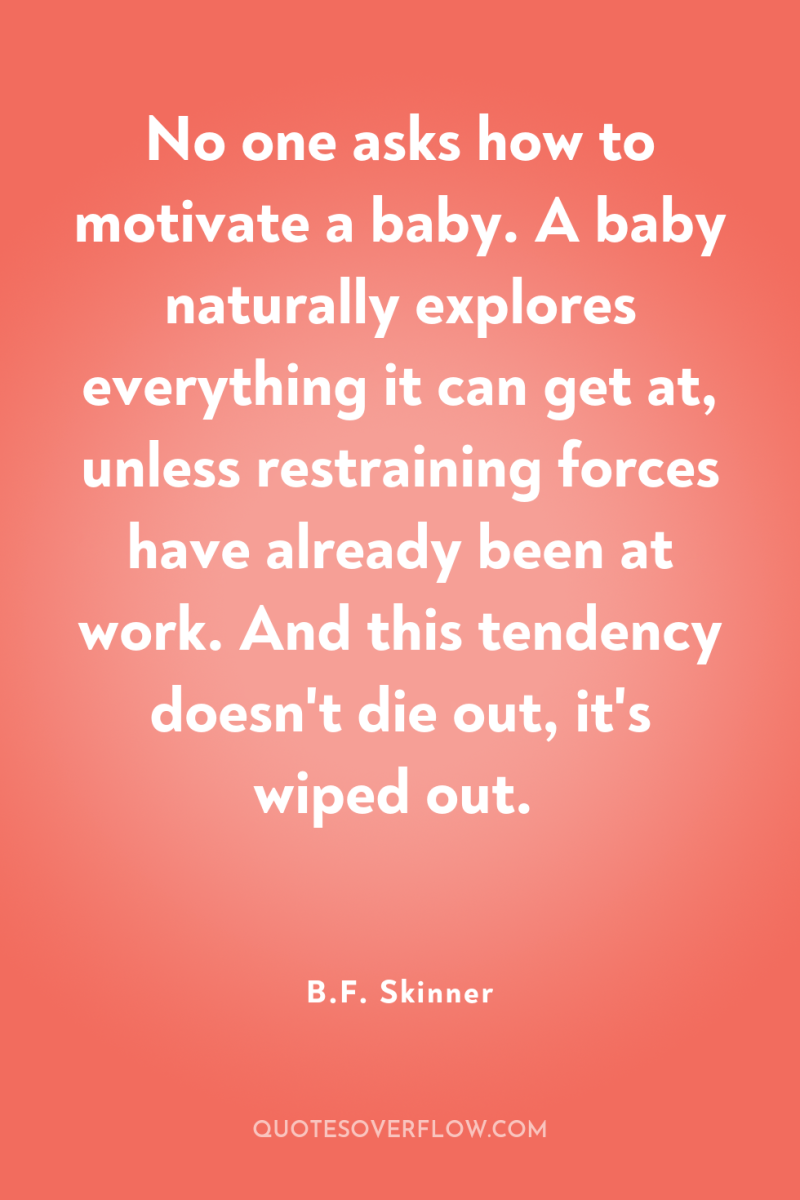
53
No one asks how to motivate a baby. A baby naturally explores everything it can get at, unless restraining forces have already been at work. And this tendency doesn't die out, it's wiped out.B.F. Skinner
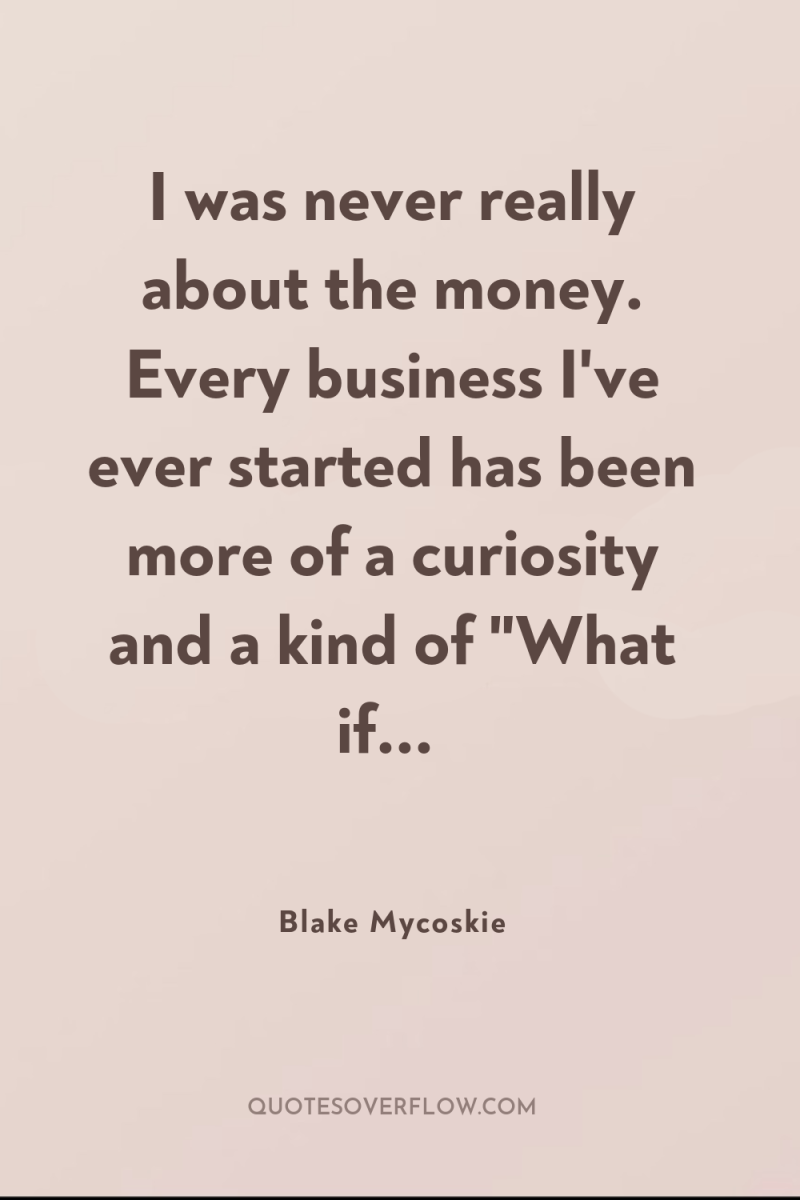
54
I was never really about the money. Every business I've ever started has been more of a curiosity and a kind of "What if...Blake Mycoskie
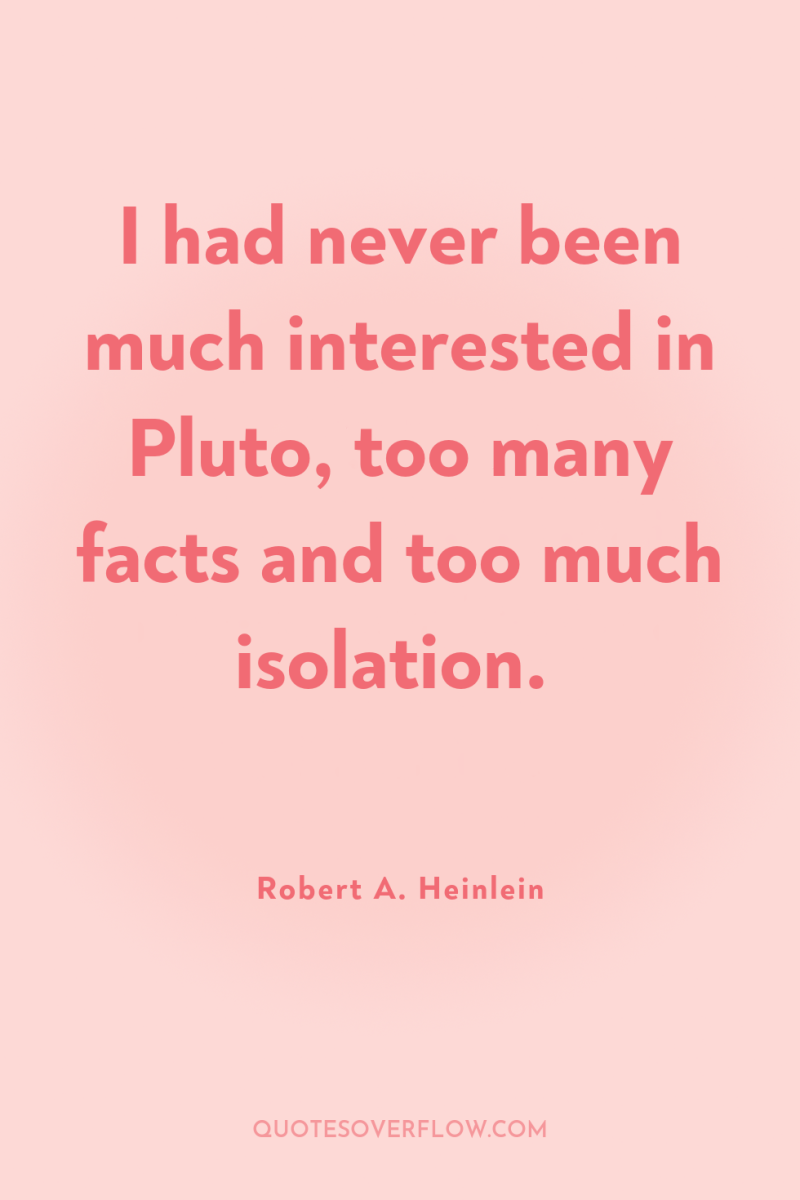
55
I had never been much interested in Pluto, too many facts and too much isolation.Robert A. Heinlein
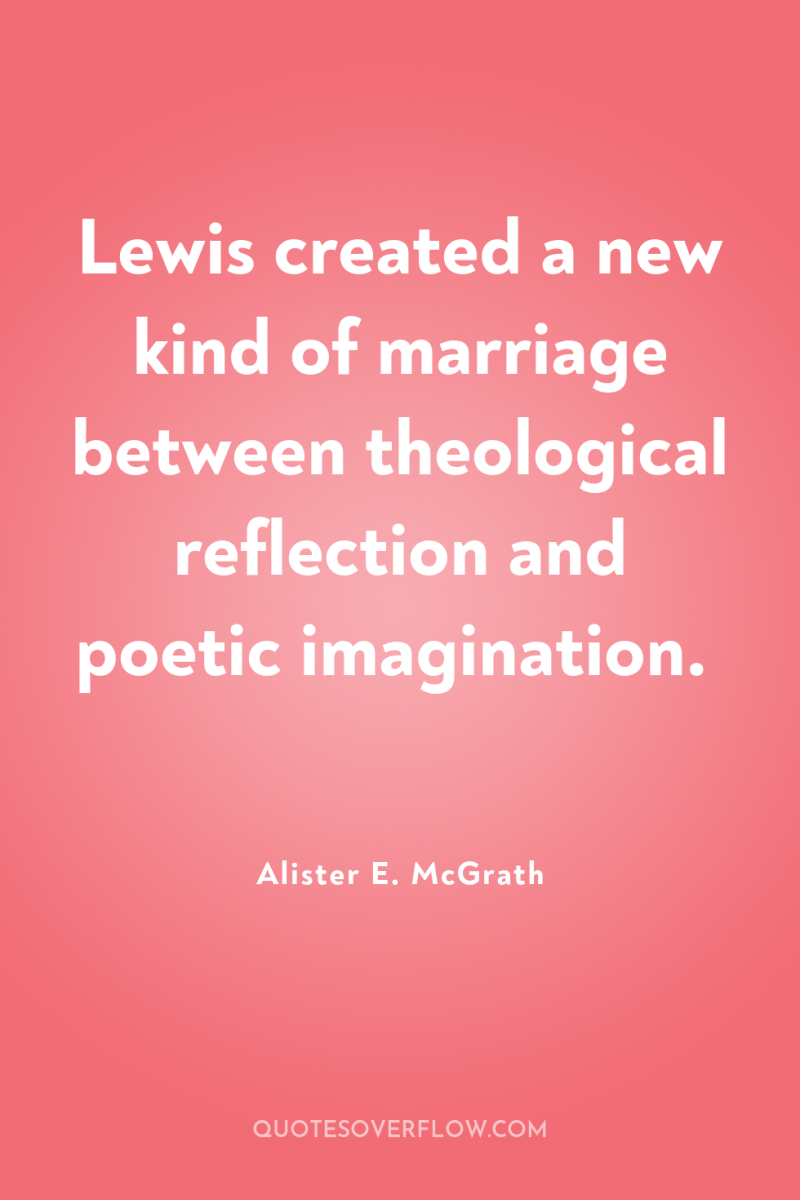
56
Lewis created a new kind of marriage between theological reflection and poetic imagination.Alister E. McGrath

57
It doesn't count if it's from friends, right?Svetlana Chmakova
58
I think he just loved being with the bears because they didn't make him feel bad. I get it too. When he was with the bears, they didn't care that he was kind of weird, or that he'd gotten into trouble for drinking too much and using drugs(which apparently he did a lot of). They didn't ask him a bunch of stupid questions about how he felt, or why he did what he did. They just let him be who he was.Michael Thomas Ford
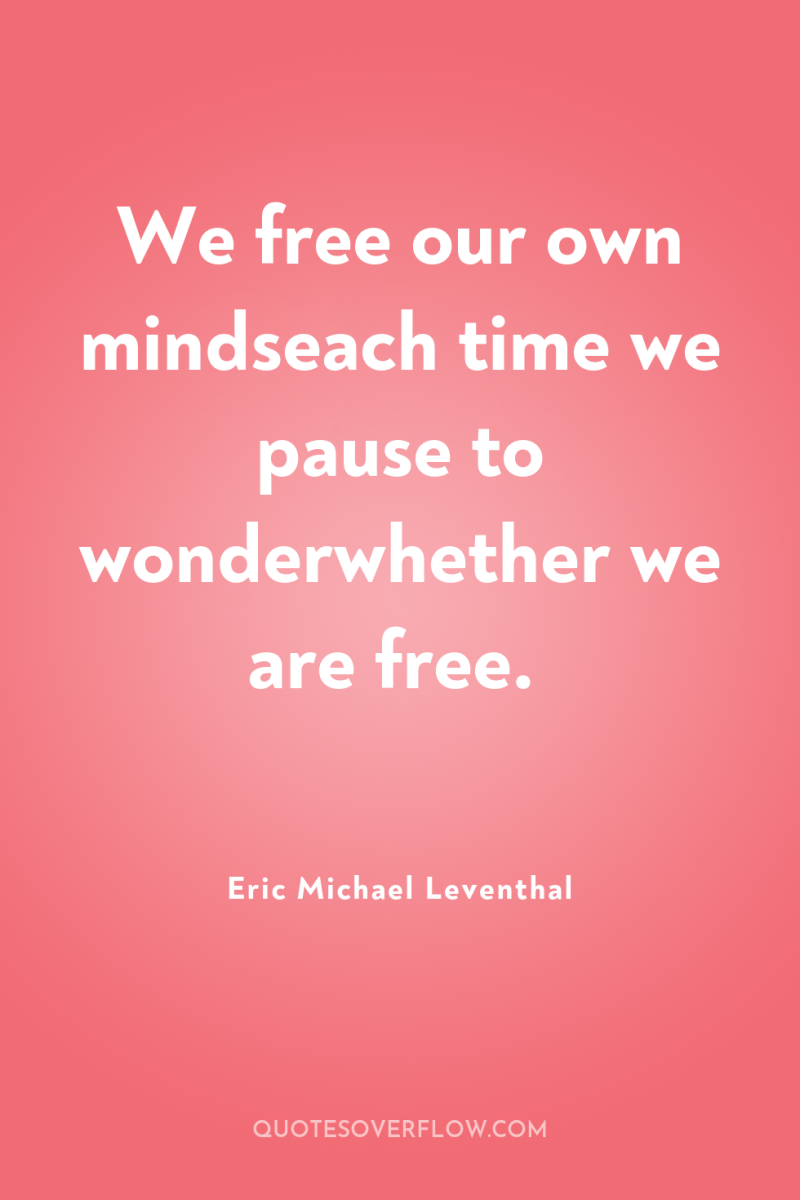
59
We free our own mindseach time we pause to wonderwhether we are free.Eric Michael Leventhal
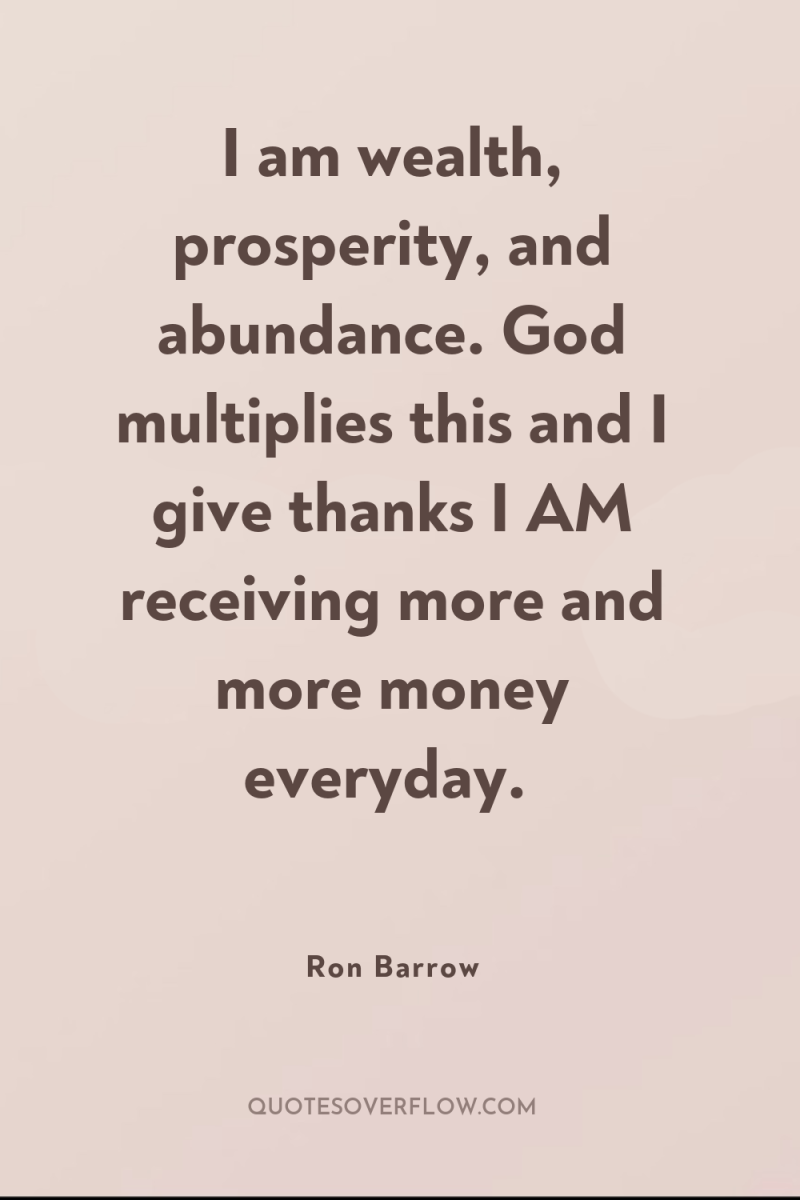
60
I am wealth, prosperity, and abundance. God multiplies this and I give thanks I AM receiving more and more money everyday.Ron Barrow
61
Casting a curious gaze down on planet Earth, extra-terrestrial beings could well be forgiven for assuming that we humans are programmed in every move we make, by a palm-sized, oblong, slab of glass. More perplexing than that, who on earth could convince them otherwise ?Alex Morritt
62
You want to fix yourself, change yourself, become someone better. But what about who you already are? You want to craft a mask to wear–something to cover your face. But you already have a face. You are already something. Your task, as a human being, is not self-augmentation, but self-discovery. Look at yourself with curiosity. Let yourself explore your interests. Delve into your talents. Face your fears. Accept your faults, and give yourself unconditional love. By learning to explore yourself, you will naturally become the best version of yourself. Of course, you invent your life, but you do not invent your passions. Some things, you must create, and others you must discover. Learn to be curious about yourself. Then, you will be on the right path.Vironika Tugaleva
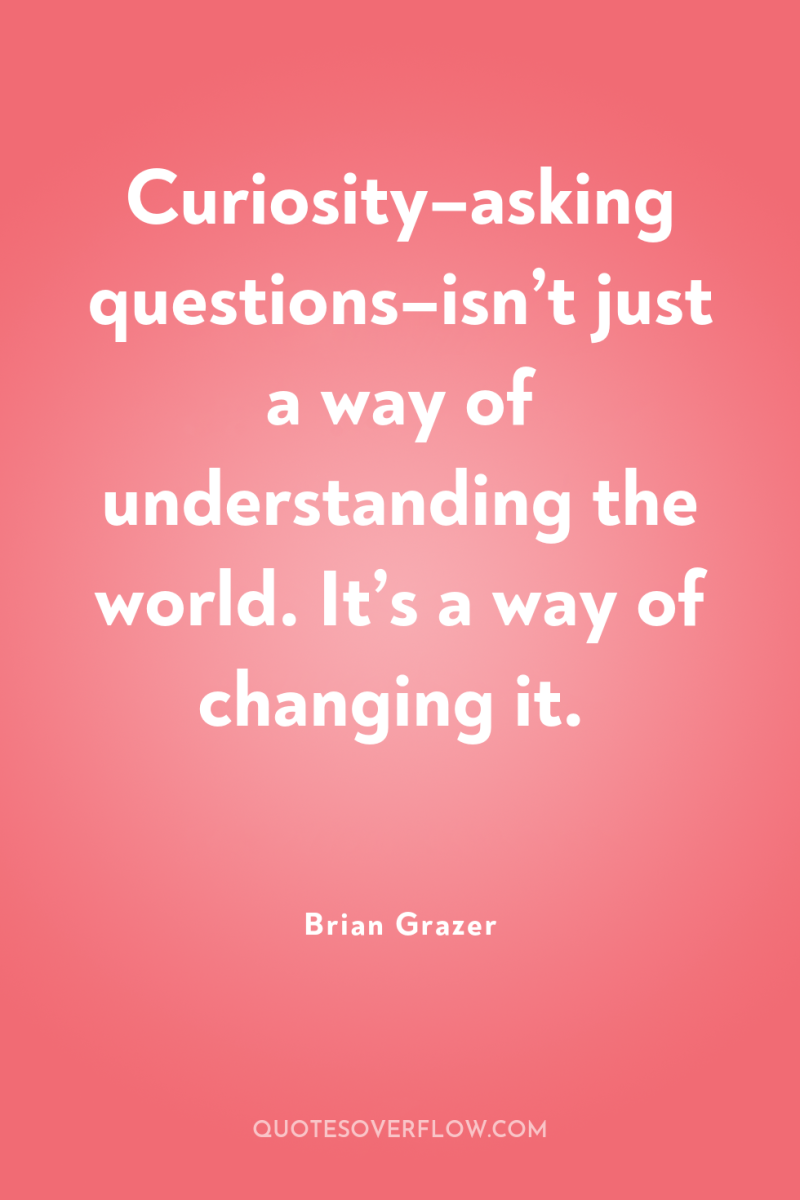
63
Curiosity–asking questions–isn’t just a way of understanding the world. It’s a way of changing it.Brian Grazer

64
If you read, you will transform your life.Lailah Gifty Akita
65
A kind of northing is what I wish to accomplish, a single-minded trek towards that place where any shutter left open to the zenith at night will record the wheeling of all the sky’s stars as a pattern of perfect, concentric circles. I seek a reduction, a shedding, a sloughing off. At the seashore you often see a shell, or fragment of a shell, that sharp sands and surf have thinned to a wisp. There is no way you can tell what kind of shell it had been, what creature it had housed; it could have been a whelk or a scallop, a cowrie, limpet, or conch. The animal is long since dissolved, and its blood spread and thinned in the general sea. All you hold in your hand is a cool shred of shell, an inch long, pared so thin that it passes a faint pink light. It is an essence, a smooth condensation of the air, a curve. I long for the North where unimpeded winds would hone me to such a pure slip of bone. But I’ll not go northing this year. I’ll stalk that floating pole and frigid air by waiting here. I wait on bridges; I wait, struck, on forest paths and meadow’s fringes, hilltops and banksides, day in and day out, and I receive a southing as a gift. The North washes down the mountains like a waterfall, like a tidal wave, and pours across the valley; it comes to me. It sweetens the persimmons and numbs the last of the crickets and hornets; it fans the flames of the forest maples, bows the meadow’s seeded grasses and pokes it chilling fingers under the leaf litter, thrusting the springtails and the earthworms deeper into the earth. The sun heaves to the south by day, and at night wild Orion emerges looming like the Specter over Dead Man Mountain. Something is already here, and more is coming.Annie Dillard
66
I have often noticed that these things, which obsess me, neither bother nor impress other people even slightly. I am horribly apt to approach some innocent at a gathering, and like the ancient mariner, fix him with a wild, glitt’ring eye and say, “Do you know that in the head of the caterpillar of the ordinary goat moth there are two hundred twenty-eight separate muscles?” The poor wretch flees. I am not making chatter; I mean to change his life.Annie Dillard
67
All at once, something wonderful happened, although at first, it seemed perfectly ordinary. A female goldfinch suddenly hove into view. She lighted weightlessly on the head of a bankside purple thistle and began emptying the seedcase, sowing the air with down. The lighted frame of my window filled. The down rose and spread in all directions, wafting over the dam’s waterfall and wavering between the tulip trunks and into the meadow. It vaulted towards the orchard in a puff; it hovered over the ripening pawpaw fruit and staggered up the steep faced terrace. It jerked, floated, rolled, veered, swayed. The thistle down faltered down toward the cottage and gusted clear to the woods; it rose and entered the shaggy arms of pecans. At last it strayed like snow, blind and sweet, into the pool of the creek upstream, and into the race of the creek over rocks down. It shuddered onto the tips of growing grasses, where it poised, light, still wracked by errant quivers. I was holding my breath. Is this where we live, I thought, in this place in this moment, with the air so light and wild? The same fixity that collapses stars and drives the mantis to devour her mate eased these creatures together before my eyes: the thick adept bill of the goldfinch, and the feathery coded down. How could anything be amiss? If I myself were lighter and frayed, I could ride these small winds, too, taking my chances, for the pleasure of being so purely played. The thistle is part of Adam’s curse. “Cursed is the ground for thy sake, in sorrow shalt thou eat of it; thorns also and thistles shall it bring forth to thee.” A terrible curse: But does the goldfinch eat thorny sorrow with the thistle or do I? If this furling air is fallen, then the fall was happy indeed. If this creekside garden is sorrow, then I seek martyrdom. I was weightless; my bones were taut skins blown with buoyant gas; it seemed that if I inhaled too deeply, my shoulders and head would waft off. Alleluia. .Annie Dillard
68
Today is the winter solstice. The planet tilts just so to its star, lists and holds circling in a fixed tension between veering and longing, and spins helpless, exalted, in and out of that fleet blazing touch. Last night Orion vaulted and spread all over the sky, pagan and lunatic, his shoulder and knee on fire, his sword three suns at the ready-for what? I won’t see this year again, not again so innocent; and longing wrapped round my throat like a scarf. “For the Heavenly Father desires that we should see, ” says Ruysbroeck, “and that is why He is ever saying to our inmost spirit one deep unfathomable word and nothing else.” But what is the word? Is this mystery or coyness? A cast-iron bell hung from the arch of my rib cage; when I stirred, it rang, or it tolled, a long syllable pulsing ripples up my lungs and down the gritty sap inside my bones, and I couldn’t make it out; I felt the voiced vowel like a sigh or a note but I couldn’t catch the consonant that shaped it into sense. .Annie Dillard
69
In the forty minutes I watched the muskrat, he never saw me, smelled me, or heard me at all. When he was in full view of course I never moved except to breathe. My eyes would move, too, following his, but he never noticed. Only once, when he was feeding from the opposite bank about eight feet away did he suddenly rise upright, all alert- and then he immediately resumed foraging. But he never knew I was there. I never knew I was there, either. For that forty minutes last night I was as purely sensitive and mute as a photographic plate; I received impressions, but I did not print out captions. My own self-awareness had disappeared; it seems now almost as though, had I been wired to electrodes, my EEG would have been flat. I have done this sort of thing so often that I have lost self-consciousness about moving slowly and halting suddenly. And I have often noticed that even a few minutes of this self-forgetfulness is tremendously invigorating. I wonder if we do not waste most of our energy just by spending every waking minute saying hello to ourselves. Martin Buber quotes an old Hasid master who said, “When you walk across the field with your mind pure and holy, then from all the stones, and all growing things, and all animals, the sparks of their souls come out and cling to you, and then they are purified and become a holy fire in you.Annie Dillard
70
The color-patches of vision part, shift, and reform as I move through space in time. The present is the object of vision, and what I see before me at any given second is a full field of color patches scattered just so. The configuration will never be repeated. Living is moving; time is a live creek bearing changing lights. As I move, or as the world moves around me, the fullness of what I see shatters. “Last forever! ” Who hasn’t prayed that prayer? You were lucky to get it in the first place. The present is a freely given canvas. That it is constantly being ripped apart and washed downstream goes without saying; it is a canvas, nevertheless. But there is more to the present than a series of snapshots. We are not merely sensitized film; we have feelings, a memory for information and an eidetic memory for the imagery of our pasts. Our layered consciousness is a tiered track for an unmatched assortment of concentrically wound reels. Each one plays out for all of life its dazzle and blur of translucent shadow-pictures; each one hums at every moment its own secret melody in its own unique key. We tune in and out. But moments are not lost. Time out of mind is time nevertheless, cumulative, informing the present. From even the deepest slumber you wake with a jolt- older, closer to death, and wiser, grateful for breath. But time is the one thing we have been given, and we have been given to time. Time gives us a whirl. We keep waking from a dream we can’t recall, looking around in surprise, and lapsing back, for years on end. All I want to do is stay awake, keep my head up, prop my eyes open, with toothpicks, with trees.Annie Dillard
71
Xerxes, I read, ‘halted his unwieldy army for days that he might contemplate to his satisfaction’ the beauty of a single sycamore. You are Xerxes in Persia. Your army spreads on a vast and arid peneplain…you call to you all your sad captains, and give the order to halt. You have seen the tree with the lights in it, haven’t you? You must have. Xerxes buffeted on a plain, ambition drained in a puff. Your men are bewildered…there is nothing to catch the eye in this flatness, nothing but a hollow, hammering sky, a waste of sedge in the lee of windblown rocks, a meager ribbon of scrub willow tracing a slumbering watercourse…and that sycamore. You saw it; you will stand rapt and mute, exalted, remembering or not remembering over a period of days to shade your head with your robe. “He had its form wrought upon a medal of gold to help him remember it the rest of his life.” We all ought to have a goldsmith following us around. But it goes without saying, doesn’t it, Xerxes, that no gold medal worn around your neck will bring back the glad hour, keep those lights kindled so long as you live, forever present? Pascal saw it; he grabbed pen and paper and scrawled the one word, and wore it sewn in his shirt the rest of his life. I don’t know what Pascal saw. I saw a cedar. Xerxes saw a sycamore.Annie Dillard
72
And under the cicadas, deeper down that the longest taproot, between and beneath the rounded black rocks and slanting slabs of sandstone in the earth, ground water is creeping. Ground water seeps and slides, across and down, across and down, leaking from here to there, minutely at a rate of a mile a year. What a tug of waters goes on! There are flings and pulls in every direction at every moment. The world is a wild wrestle under the grass; earth shall be moved. What else is going on right this minute while ground water creeps under my feet? The galaxy is careening in a slow, muffled widening. If a million solar systems are born every hour, then surely hundreds burst into being as I shift my weight to the other elbow. The sun’s surface is now exploding; other stars implode and vanish, heavy and black, out of sight. Meteorites are arcing to earth invisibly all day long. On the planet, the winds are blowing: the polar easterlies, the westerlies, the northeast and southeast trades. Somewhere, someone under full sail is becalmed, in the horse latitudes, in the doldrums; in the northland, a trapper is maddened, crazed, by the eerie scent of the chinook, the sweater, a wind that can melt two feet of snow in a day. The pampero blows, and the tramontane, and the Boro, sirocco, levanter, mistral. Lick a finger; feel the now. Spring is seeping north, towards me and away from me, at sixteen miles a day. Along estuary banks of tidal rivers all over the world, snails in black clusters like currants are gliding up and down the stems of reed and sedge, migrating every moment with the dip and swing of tides. Behind me, Tinker Mountain is eroding one thousandth of an inch a year. The sharks I saw are roving up and down the coast. If the sharks cease roving, if they still their twist and rest for a moment, they die. They need new water pushed into their gills; they need dance. Somewhere east of me, on another continent, it is sunset, and starlings in breathtaking bands are winding high in the sky to their evening roost. The mantis egg cases are tied to the mock-orange hedge; within each case, within each egg, cells elongate, narrow, and split; cells bubble and curve inward, align, harden or hollow or stretch. And where are you now? .Annie Dillard
73
I want to think about trees. Trees have a curious relationship to the subject of the present moment. There are many created things in the universe that outlive us, that outlive the sun, even, but I can’t think about them. I live with trees. There are creatures under our feet, creatures that live over our heads, but trees live quite convincingly in the same filament of air we inhabit, and in addition, they extend impressively in both directions, up and down, shearing rock and fanning air, doing their real business just out of reach.Annie Dillard
74
You are God. You want to make a forest, something to hold the soil, lock up energy, and give off oxygen. Wouldn’t it be simpler just to rough in a slab of chemicals, a green acre of goo? You are a man, a retired railroad worker who makes replicas as a hobby. You decide to make a replica of one tree, the longleaf pine your great-grandfather planted- just a replica- it doesn’t have to work. How are you going to do it? How long do you think you might live, how good is your glue? For one thing, you are going to have to dig a hole and stick your replica trunk halfway to China if you want the thing to stand up. Because you will have to work fairly big; if your replica is too small, you’ll be unable to handle the slender, three-sided needles, affix them in clusters of three in fascicles, and attach those laden fascicles to flexible twigs. The twigs themselves must be covered by “many silvery-white, fringed, long-spreading scales.” Are your pine cones’ scales “thin, flat, rounded at the apex?” When you loose the lashed copper wire trussing the limbs to the trunk, the whole tree collapses like an umbrella. You are a sculptor. You climb a great ladder; you pour grease all over a growing longleaf pine. Next, you build a hollow cylinder around the entire pine…and pour wet plaster over and inside the pine. Now open the walls, split the plaster, saw down the tree, remove it, discard, and your intricate sculpture is ready: this is the shape of part of the air. You are a chloroplast moving in water heaved one hundred feet above ground. Hydrogen, carbon, oxygen, nitrogen in a ring around magnesium…you are evolution; you have only begun to make trees. You are god- are you tired? Finished?.Annie Dillard
75
Shadow is the blue patch where the light doesn’t hit. It is mystery itself, and mystery is the ancients’ ultima Thule, the modern explorer’s Point of Relative Inaccessibility, that boreal point most distant from all known lands. There the twin oceans of beauty and horror meet. The great glaciers are calving. Ice that sifted to earth as snow in the time of Christ shears from the pack with a roar and crumbles to water. It could be that our instruments have not looked deeply enough. The RNA deep in the mantis’s jaw is a beautiful ribbon. Did the crawling Polyphemus moth have in its watery heart one cell, and in that cell one special molecule, and that molecule one hydrogen atom, and round that atom’s nucleus one wild, distant electron that split showed a forest, swaying? .Annie Dillard
76
I was in no tent under leaves, sleepless and glad. There was no moon at all; along the world’s coasts the sea tides would be springing strong. The air itself also has lunar tides; I lay still. Could I feel in the air an invisible sweep and surge, and an answering knock in the lungs? Or could I feel the starlight? Every minute on a square mile of this land one ten thousandth of an ounce of starlight spatters to earth. What percentage of an ounce did that make on my eyes and cheeks and arms, tapping and nudging as particles, pulsing and stroking as waves? .Annie Dillard
77
It looked as though the leaves of the autumn forest had taken flight, and were pouring down the valley like a waterfall, like a tidal wave, all the leaves of the hardwoods from here to Hudson’s Bay. It was as if the season’s colors were draining away like lifeblood, as if the year were molting and shedding. The year was rolling down, and a vital curve had been reached, the tilt that gives way to headlong rush. And when the monarch butterflies had passed and were gone, the skies were vacant, the air poised. The dark night into which the year was plunging was not a sleep but an awakening, a new and necessary austerity, the sparer climate for which I longed. The shed trees were brittle and still, the creek light and cold, and my spirit holding its breath.Annie Dillard
78
Those people who shoot endless time-lapse films of unfurling roses and tulips have the wrong idea. They should train their cameras instead on the melting of pack ice, the green filling of ponds, the tidal swings… They should film the glaciers of Greenland, some of which creak along at such a fast clip that even the dogs bark at them. They should film the invasion of the southernmost Canadian tundra by the northernmost spruce-fir forest, which is happening right now at the rate of a mile every 10 years. When the last ice sheet receded from the North American continent, the earth rebounded 10 feet. Wouldn’t that have been a sight to see? .Annie Dillard
79
Say you could view a time-lapse film of our planet: what would you see? Transparent images moving through light, “an infinite storm of beauty.” The beginning is swaddled in mists, blasted by random blinding flashes. Lava pours and cools; seas boil and flood. Clouds materialize and shift; now you can see the earth’s face through only random patches of clarity. The land shudders and splits, like pack ice rent by a widening lead. Mountains burst up, jutting and dull and soften before your eyes, clothed in forests like felt. The ice rolls up, grinding green land under water forever; the ice rolls back. Forests erupt and disappear like fairy rings. The ice rolls up-mountains are mowed into lakes, land rises wet from the sea like a surfacing whale- the ice rolls back. A blue-green streaks the highest ridges, a yellow-green spreads from the south like a wave up a strand. A red dye seems to leak from the north down the ridges and into the valleys, seeping south; a white follows the red, then yellow-green washes north, then red spreads again, then white, over and over, making patterns of color too swift and intricate to follow. Slow the film. You see dust storms, locusts, floods, in dizzying flash frames. Zero in on a well-watered shore and see smoke from fires drifting. Stone cities rise, spread, and then crumble, like patches of alpine blossoms that flourish for a day an inch above the permafrost, that iced earth no root can suck, and wither in a hour. New cities appear, and rivers sift silt onto their rooftops; more cities emerge and spread in lobes like lichen on rock. The great human figures of history, those intricate, spirited tissues that roamed the earth’s surface, are a wavering blur whose split second in the light was too brief an exposure to yield any images. The great herds of caribou pour into the valleys and trickle back, and pour, a brown fluid. Slow it down more, come closer still. A dot appears, like a flesh-flake. It swells like a balloon; it moves, circles, slows, and vanishes. This is your life.Annie Dillard
80
Last year I had a very unusual experience. I was awake, with my eyes closed, when I had a dream. It was a small dream about time. I was dead, I guess, in deep blank space high up above many white stars. My own consciousness had been disclosed to me, and I was happy. Then I saw far below me a long, curved band of color. As I came closer, I saw that it stretched endlessly in either direction, and I understood that I was seeing all the time of the planet where I had lived. It looked like a woman’s tweed scarf; the longer I studied any one spot, the more dots of color I saw. There was no end to the deepness and variety of dots. At length I started to look for my time, but, although more and more specks of color and deeper and more intricate textures appeared in the fabric, I couldn’t find my time, or any time at all that I recognized as being near my time. I couldn’t make out so much as a pyramid. Yet as I looked at the band of time, all the individual people, I understood with special clarity, were living at that very moment with great emotion, in intricate, detail, in their individual times and places, and they were dying and being replaced by ever more people, one by one, like stitches in which wholly worlds of feeling and energy were wrapped in a never-ending cloth. I remembered suddenly the color and texture of our life as we knew it- these things had been utterly forgotten- and I thought as I searched for it on the limitless band, “that was a good time then, a good time to be living.” And I began to remember our time. I recalled green fields with carrots growing, one by one, in slender rows. Men and women in bright vests and scarves came and pulled the carrots out of the soil and carried them in baskets to shaded kitchens, where they scrubbed them with yellow brushes under running water. I saw white-faced cattle lowing and wading in creeks. I saw May apples in forests, erupting through leaf-strewn paths. Cells on the root hairs of sycamores split and divided, and apples grew spotted and striped in the fall. Mountains kept their cool caves and squirrels raced home to their nests through sunlight and shade. I remembered the ocean, and I seemed to be in the ocean myself, swimming over orange crabs that looked like coral, or off the deep Atlantic banks where whitefish school. Or again I saw the tops of poplars, and the whole sky brushed with clouds in pallid streaks, under which wild ducks flew with outstretched necks, and called, one by one, and flew on. All these things I saw. Scenes grew in depth and sunlit detail before my eyes, and were replaced by ever more scenes, as I remember the life of my time with increasing feeling. At last I saw the earth as a globe in space, and I recalled the ocean’s shape and the form of continents, saying to myself with surprise as I looked at the planet, “yes, that’s how it was then, that part there was called France.” I was filled with the deep affection of nostalgia- and then I opened my eyes. We all ought to be able to conjure up sights like these at will, so that we can keep in mind the scope of texture’s motion in time.Annie Dillard
81
Were the earth as smooth as a ball bearing, it might be beautiful seen from another planet, as the rings of Saturn are. But here we live and move; we wander up and down the banks of the creek, we ride a railway through the Alps, and the landscape shifts and changes. Were the earth smooth, our brains would be smooth as well; we would wake, blink, walk two steps to get the whole picture and lapse into dreamless sleep. Because we are living people, and because we are on the receiving end of beauty, another element necessarily enters the question. The texture of space is a condition of time. Time is the warp and matter the weft of woven texture of beauty in space, and death is the hurtling shuttle… What I want to do, then, is add time to the texture, paint the landscape on an unrolling scroll, and set the giant relief globe spinning on it stand.Annie Dillard
82
Our life is a faint tracing on the surface of mystery. The surface of mystery is not smooth, any more than the planet is smooth; not even a single hydrogen atom is smooth, let alone a pine. Nor does it fit together; not even the chlorophyll and hemoglobin molecules are a perfect match, for, even after the atom of iron replaces the magnesium, long streamers of disparate atoms trail disjointedly from the rims of the molecule’s loops. Freedom cuts both ways. Mystery itself is as fringed and intricate at the shape of the air at times. Forays into mystery cut bays and fine fjords, but the forested mainland itself is implacable both in its bulk and in its most filigreed fringe of detail.Annie Dillard
83
I am sitting here, you are sitting there. Say even that you are sitting across the kitchen table from me right now. Our eyes meet; a consciousness snaps back and forth. What we know, at least for starters, is: here we- so incontrovertibly- are. This is our life, these are our lighted seasons, and then we die. In the meantime, in between time, we can see. The scales are fallen from our eyes, the cataracts are cut away, and we can work at making sense of the color-patches we see in an effort to discover where we so incontrovertibly are. I am as passionately interested in where I am as is a lone sailor sans sextant in a ketch on an open ocean. I have at the moment a situation which allows me to devote considerable hunks of time to seeing what I can see, and trying to piece it together. I’ve learned the name of some color-patches, but not the meanings. I’ve read books; I’ve gathered statistics feverishly: the average temperature of our planet is 57 degrees F…The average size of all living animals, including man, is almost that of a housefly. The earth is mostly granite, which is mostly oxygen… In these Appalachians we have found a coal bed with 120 seams, meaning 120 forests that just happened to fall into water… I would like to see it all, to understand it, but I must start somewhere, so I try to deal with the giant water bug in Tinker Creek and the flight of three hundred redwings from an Osage orange and let those who dare worry about the birthrate and population explosion among solar systems. So I think about the valley. And it occurs to me more and more that everything I have seen is wholly gratuitous. The giant water bug’s predations, the frog’s croak, the tree with the lights in it are not in any real sense necessary per se to the world or its creator. Nor am I. The creation in the first place, being itself, is the only necessity for which I would die, and I shall. The point about that being, as I know it here and see it, is that as I think about it, it accumulates in my mind as an extravagance of minutiae. The sheer fringe and network of detail assumes primary importance. That there are so many details seems to be the most important and visible fact about creation. If you can’t see the forest for the trees, then look at the trees; when you’ve looked at enough trees, you’ve seen a forest, you’ve got it. If the world is gratuitous, then the fringe of a goldfish’s fin is a million times more so. The first question- the one crucial one- of the creation of the universe and the existence of something as a sign and an affront to nothing is a blank one… The old Kabbalistic phrase is “the Mystery of the Splintering of the Vessels.” The words refer to the shrinking or imprisonment of essences within the various husk-covered forms of emanation or time. The Vessels splintered and solar systems spun; ciliated rotifers whirled in still water, and newts laid tracks in the silt-bottomed creek. Not only did the Vessels splinter; they splintered exceeding fine. Intricacy then is the subject, the intricacy of the created world.Annie Dillard
84
Yesterday I watched a curious nightfall. The cloud ceiling took on a warm tone, deepened, and departed as if drawn on a leash. I could no longer see the fat snow flying against the sky; I could see it only as it fell before dark objects. Any object at a distance —like the dead, ivy-covered walnut I see from the bay window- looked like a black and white frontispiece seen through a sheet of white tissue. It was like dying, this watching the world recede into deeper and deeper blues while the snow piled; silence swelled and extended, distance dissolved, and soon only concentration at the largest shadows let me make out the movement of falling snow, and that too failed. The snow on the yard was blue as ink, faintly luminous; the sky violet. The bay window betrayed me, and started giving me back the room’s lamps. It was like dying, that growing dimmer and deeper and then going out.Annie Dillard
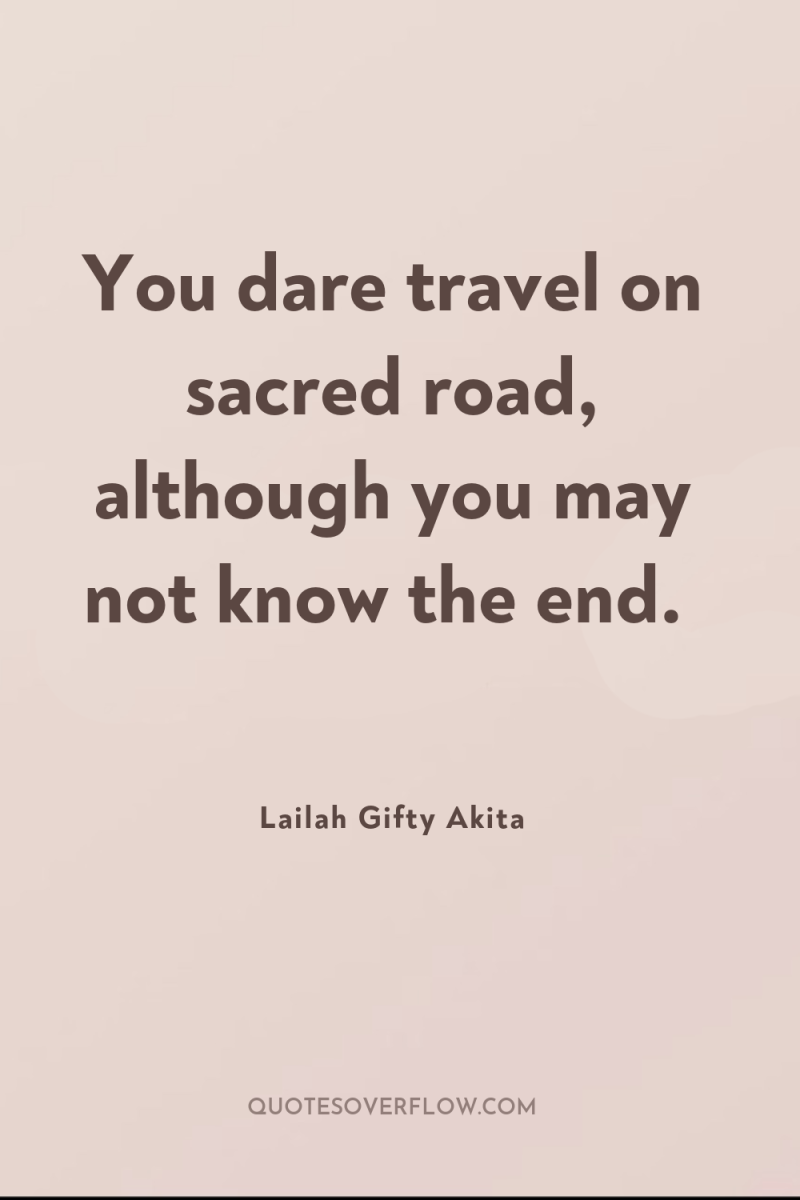
85
You dare travel on sacred road, although you may not know the end.Lailah Gifty Akita

86
Life seeks for willing soul. You can be the one.Lailah Gifty Akita
87
A storyteller, a displaced poet, will absorb reading differently.Richard Brookhiser
88
Curiosity is the main energy...Robert Rauschenberg
89
A person does not reach the pinnacle of self-realization without relentlessly exploring the parameters of the self, exhausting their psychic energy coming to know oneself. Without society to rebel against and to sail away from, there would be no advances in civilization; there would be no need for healers and mystics, priests and artist, or shaman and writers. It is our curiosity and refusal to be satisfied with the status quo that compels us to challenge ourselves to learn and continue to grow. We only establish inner peace of mind with acceptance of the world, with the recognition of our connection to the entirety of the universe, and understanding that chaos and change are inevitable. We must also love because without love there are no acts of creation. Without love, humankind is a spasmodic pool of brutality and suffering. Love is a balm. It cures human aches and pains; it unites couples, families, and cultures. Love is a creative force, without love there is no art or religion. Art expresses thought and feelings, an articulation of adore and reverence. .Kilroy J. Oldster
90
Art doesn’t give rise to anything in us that isn’t already there. It simply stirs our curious consciousness and sparks a fire that illuminates who we have always wanted to be.Kamand Kojouri
91
At home the bookshelves connected heaven and earth.Lisel Mueller
92
President-elect Lincoln to his confidants: "The people of the South do not know us. They are not allowed to receive Republican papers down there.Harold Holzer
93
The arts are the best Time Machine we have." C. S. LewisPhilip Zaleski
94
Science is knowledge meeting humility meeting curiosity: ever-evolving, always learning. Atheism is often but knowledge meeting arrogance: a masquerade under the wing of the beauty of science. Religion is infamously a weight under the one wing; then under the other is atheism, the championed masquerade.Criss Jami
95
You wander. You work nearly every job known to man, it seems, only to arrive at the wonderings of philosophy.Criss Jami
96
No matter how knowledgeable you are, respect your parents for their experience and your children for their curiosity.Amit Kalantri
97
We may rifle the treasures of antiquity and make the heathen contribute to the gospel even as Hiram of Tyre served under Solomon's direction for the building of the Temple.Charles Haddon Spurgeon
98
How to earn a viable standard of living while giving vent to their desire to perform creative activities is the quintessential challenge for modern humans. Some people settle for jobs filled with drudgery and in their free time immerse themselves in hobbies that provide them with personal happiness. Other people prefer to find work that makes them happy, even if this occupation requires them to live a more modest standard of living. The greater their impulse is for curiosity and creativity, the less likely that a person will exchange personal happiness for economic security. .Kilroy J. Oldster
99
Your purpose, and its specific expressions, expands and accelerates as it becomes more similar to Nature’s purpose. The tools you need to apply it you collect along the path in discovering what that is. Time is there to provide you with the “opportunities” to find more creative responses to things like frustration, confusion and self-righteousness. As you gently, oh so gently and delicately, adjust to the requirements that exist in your actual circumstance, you are given the tools needed to surpass them. .Darrell Calkins
100
Conventional wisdom nor scientific, mathematical prove of randomness in life could do nothing to deter human's curiosity for the unknown, however small the chance of a positive outcome maybe.Vann Chow